Rechercher dans ce blog
Thursday, February 28, 2019
Six Held for Four Days Over Deadly Cairo Train Crash
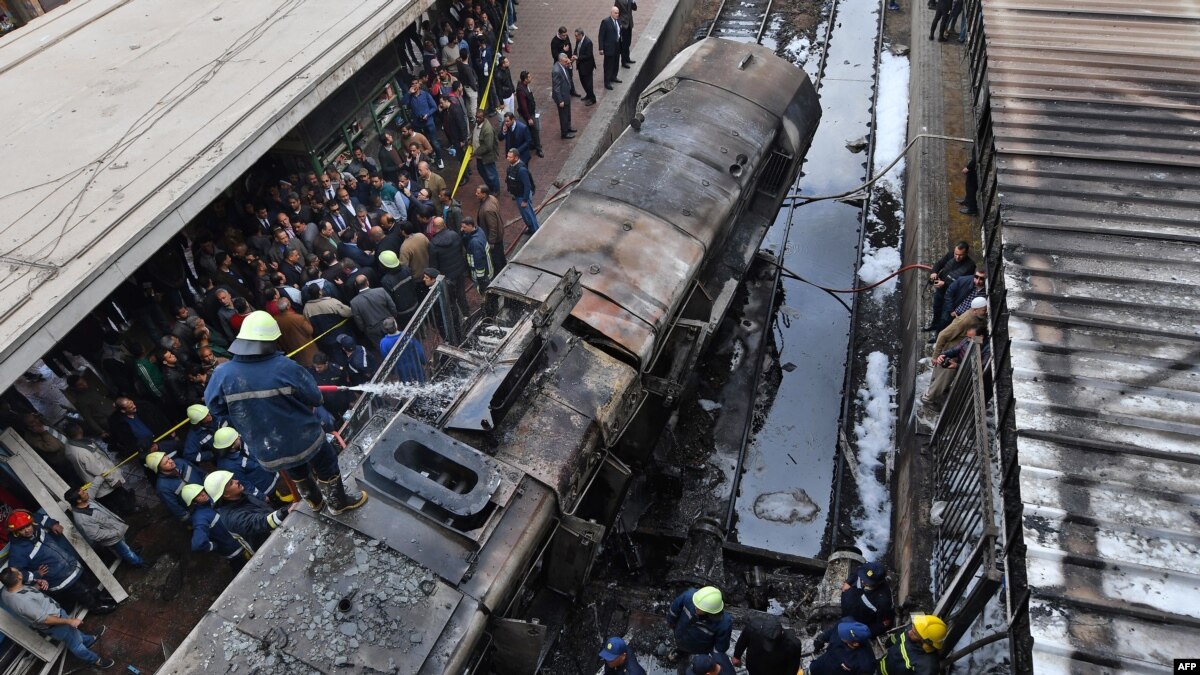
Egypt's public prosecutor on Thursday ordered the detention of six people for four days in connection with in incident in which a locomotive smashed through buffers and burst into flames at Cairo's main train station.
The train's driver, his assistant, another train driver and three other rail employees will be held for four days pending investigations into Wednesday's incident, the public prosecutor said in a statement.
Egypt's Health Minister Hala Zayed said Thursday that the death toll from the crash had risen to 22. State TV had said Wednesday that 25 people died in the crash, but the health minister revised the toll to 20 later in the day and said 43 people had been injured.
Egypt's public prosecutor said Wednesday that a preliminary investigation indicated the driver had stepped off the train to talk to another driver without pulling the hand brake, causing the unattended locomotive to speed off and hit a concrete platform.
Security camera footage from inside the capital's Ramses station showed the train failing to stop as it arrived at Platform 6, smashing through the buffers and a metal end railing and exploding into a huge ball of fire.
Transport Minister Hisham Arafat, who said the train's diesel tank had exploded, resigned Wednesday. Electricity Minister Mohamed Shaker will temporarily head the Transport Ministry, a cabinet source said Wednesday.
Netanyahu Vows to Stay On in Face of Charges
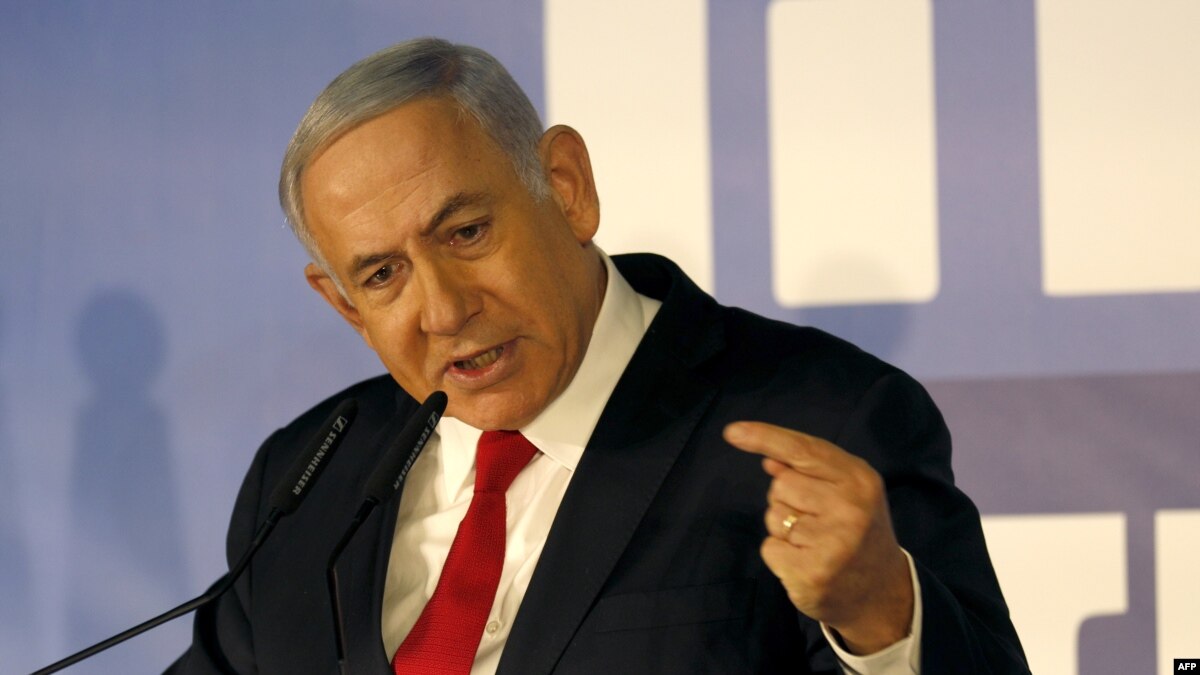
Israeli Prime Minister Benjamin Netanyahu, facing indictment for alleged corruption, says he will lead Israel for "many more years."
"Don't believe all the spin," Netanyahu told Israelis during a televised address Thursday. "But it's up to you. It's not up to the civil servants. It's not up to the television studios. It's not up to the pundits and journalists."
Echoing his close friend and ally U.S. President Donald Trump, Netanyahu called the case against him a political "witch hunt."
Culminating a two-year police investigation, Israel Attorney General Avichai Mandelblit announced his intention to indict Netanyahu on bribery, breach of trust and fraud charges.
The prime minister is suspected of accepting hundreds of thousands of dollars' worth of gifts from billionaires — including expensive champagne and cigars — and doing favors for an Israeli media magnate in exchange for favorable coverage in newspapers and the internet.
The justice ministry must hold a hearing to give Netanyahu a chance to defend himself before formal charges are filed — a process that could take months.
A general election is scheduled April 9. Netanyahu has the support of the Israeli right wing, including anti-Palestinian nationalists and religious hard-liners. But he is expected to face a tough challenge from a coalition of centrist parties.
After Saudi Pressure, EU States Move to Block Dirty-Money List
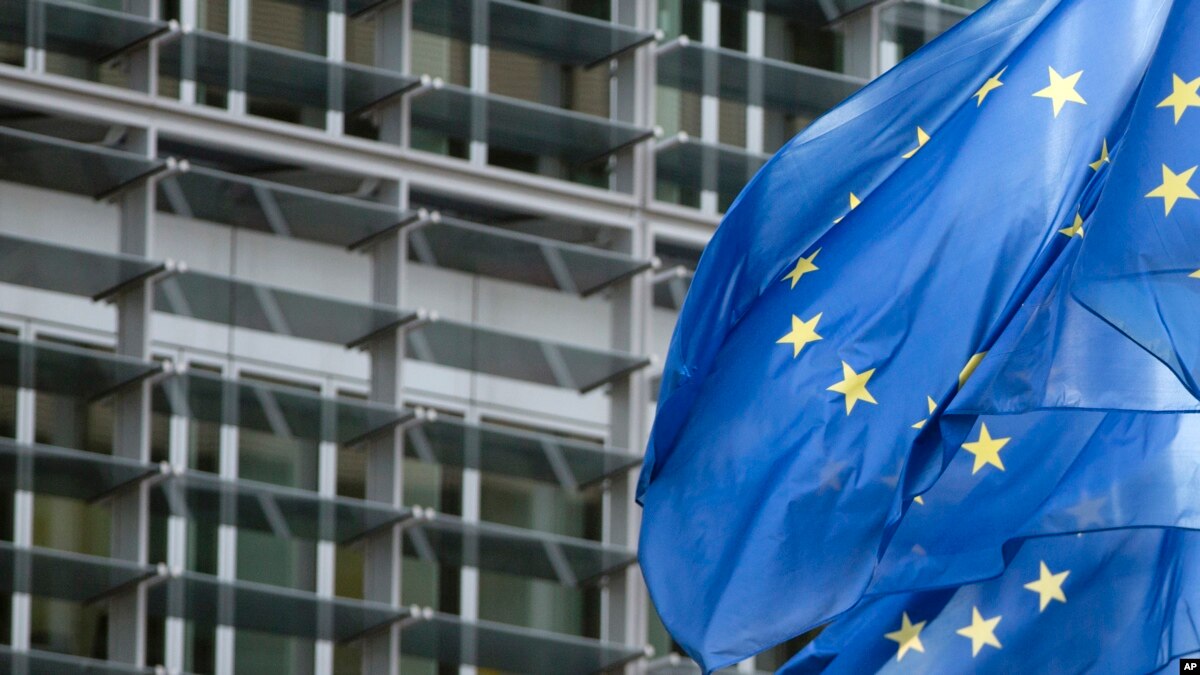
The adoption of a European Union money-laundering blacklist, which includes Saudi Arabia as well as Puerto Rico and three other U.S. territories, could be blocked by EU governments under a procedure launched on Thursday, two EU diplomats told Reuters.
At a meeting on Thursday, some national envoys opposed adopting the list, triggering a process that could lead to it being delayed or withdrawn, the diplomats said.
The move came after Saudi Arabia's King Salman sent letters to all 28 EU leaders urging them to reconsider the inclusion of Riyadh on the list, one of the letters seen by Reuters showed.
The listing of the Saudi Kingdom "will damage its reputation on the one hand and it will create difficulties in trade and investment flows between the Kingdom and the European Union on the other," the King wrote.
One diplomat said Washington has also pressured EU countries to scrap the list.
The U.S. Treasury said when the list was approved by the European Commission that the listing process was "flawed" and it rejected the inclusion of the four U.S. territories.
The diplomat said the Saudi lobby had intensified at the summit of EU and Arab League leaders earlier this week in Sharm el-Sheikh.
At that meeting, British Prime Minister Theresa May discussed the issue with the Saudi King, the diplomat said, adding that Britain and France are leading the group of EU countries opposed to the kingdom's inclusion on the list, confirming a Reuters report earlier in February.
For the list to be blocked, a majority of 21 states is necessary. EU officials said that around 15 countries have already declared their opposition to the listing.
The list was first adopted by the European Commission on Feb 13 and lists 23 jurisdictions including Nigeria, Panama, Libya, the Bahamas and the four U.S. territories of American Samoa, U.S. Virgin Islands, Puerto Rico and Guam.
For the first time, the EU listing used different criteria from those used by the Financial Action Task Force (FATF), which is the global standard-setter for anti-money laundering.
The FATF list is much smaller and does not include Saudi Arabia and U.S. territories.
Israel Awaits Decision on Netanyahu Corruption Indictment
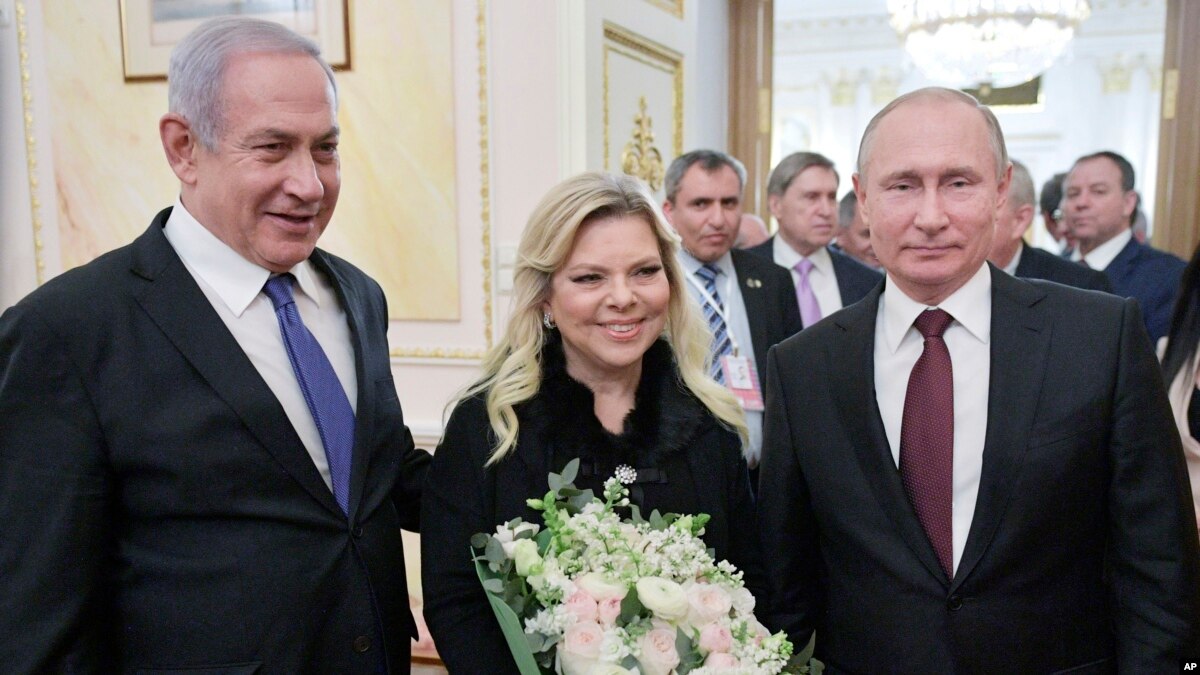
Israel’s attorney general is expected to deliver a much-anticipated decision Thursday on whether to indict Benjamin Netanyahu on a series of corruption allegations, a momentous move that looks to shake up Israel’s election campaign and potentially spell the end of the prime minister’s illustrious political career.
Attorney General Avichai Mandelblit’s aides say he is prepared to announce his decision after more than two years of intense investigations and deliberations. The aides spoke on condition of anonymity pending a formal announcement.
Police have recommended indicting Netanyahu for bribery, fraud and breach of trust in three different cases. Mandelblit is expected to inform Netanyahu’s lawyers he intends to indict pending a final hearing for the suspect, though the exact charges are not yet clear. The hearing is expected to take place after the Apr. 9 elections.
An indictment would mark the first time in Israeli history that a sitting prime minister has been charged with a crime. Former Prime Minister Ehud Olmert served time in prison for corruption, but had already resigned by the time he was charged.
Netanyahu doesn’t look to go that quietly. He denies any wrongdoing and calls the various allegations a media-orchestrated witch hunt aimed at removing him from office. He has vowed to carry on and is deadlocked in the polls, 40 days before Israelis go to vote. In a last-ditch effort to prevent the publication, Netanyahu’s Likud party has petitioned a court to have it delayed until after the elections.
Despite opposition calls for Netanyahu to step down, Likud and his other nationalist coalition partners have lined up behind him thus far, all but ruling out sitting in a government led by his primary opponent, retired military chief Benny Gantz.
While Israeli prime ministers are not required by law to resign if charged, the prospect of a prime minister standing trial while simultaneously running the country would be unchartered territory.
Mandelblit’s decision could either galvanize Netanyahu’s hard-line supporters who see him as a victim of an overzealous prosecution or turn more moderate backers against him who have tired of his lengthy rule tainted by long-standing accusations of corruption and hedonism.
Either way, the upcoming elections appear to be morphing into a referendum on Netanyahu as he seeks to become the longest serving premier in Israeli history. Netanyahu have been prime minister since 2009 and served a previous term between 1996 and 1999.
President Donald Trump, with whom Netanyahu has forged a close connection, offered the Israeli leader a boost ahead of the expected announcement.
“I just think he’s been a great prime minister and I don’t know about his difficulty but you tell me something people have been hearing about, but I don’t know about that,” he said in response to a question in Hanoi, where he was holding a summit with the leader of North Korea.
“I can say this: that he’s done a great job as prime minister. He’s tough, he’s smart, he’s strong,” Trump said.
Netanyahu rushed back Wednesday from a diplomatic mission to Moscow, and a meeting with President Vladimir Putin, to prepare for his expected rebuttal to the charges on Thursday.
The most serious allegations against Netanyahu involve his relationship with Shaul Elovitch, the controlling shareholder of Israel’s telecom giant Bezeq. Police recommended an indictment in the case based on evidence collected that confidants of Netanyahu promoted regulatory changes worth hundreds of millions of dollars to Bezeq. In exchange, they believe Netanyahu used his connections with Elovitch to receive positive press coverage on Bezeq’s popular subsidiary news site Walla. Police have said their investigation concluded that Netanyahu and Elovitch engaged in a “bribe-based relationship.”
Police say they believe there is sufficient evidence to charge Netanyahu and his wife Sara with accepting bribes, fraud and breach of trust. They also recommended charges be brought against Elovitch, members of his family and members of his Bezeq management team.
Police have previously recommended indicting Netanyahu on corruption charges in two other cases. One involves accepting gifts from billionaire friends, and the second revolves around alleged offers of advantageous legislation for a major newspaper in return for favorable coverage.
Alan Dershowitz, a prominent American lawyer, has come to Netanyahu’s defense, publishing an open letter to Mandelblit in which he warns that an indictment against the prime minister ahead of elections would undermine the democratic process.
“I’m very worried for freedom of the press and freedom of government in Israel if they start indicting people for trying to get good coverage from the media,” he told Israel’s Army Radio. “I don’t know of any other country that has criminalized trying to get good coverage and make that a basis of bribery or any other corruption investigation.”
Read More Israel Awaits Decision on Netanyahu Corruption Indictment : https://ift.tt/2H4BOK0Wednesday, February 27, 2019
Taliban Says Afghan Peace Talks with US Continue in Qatar
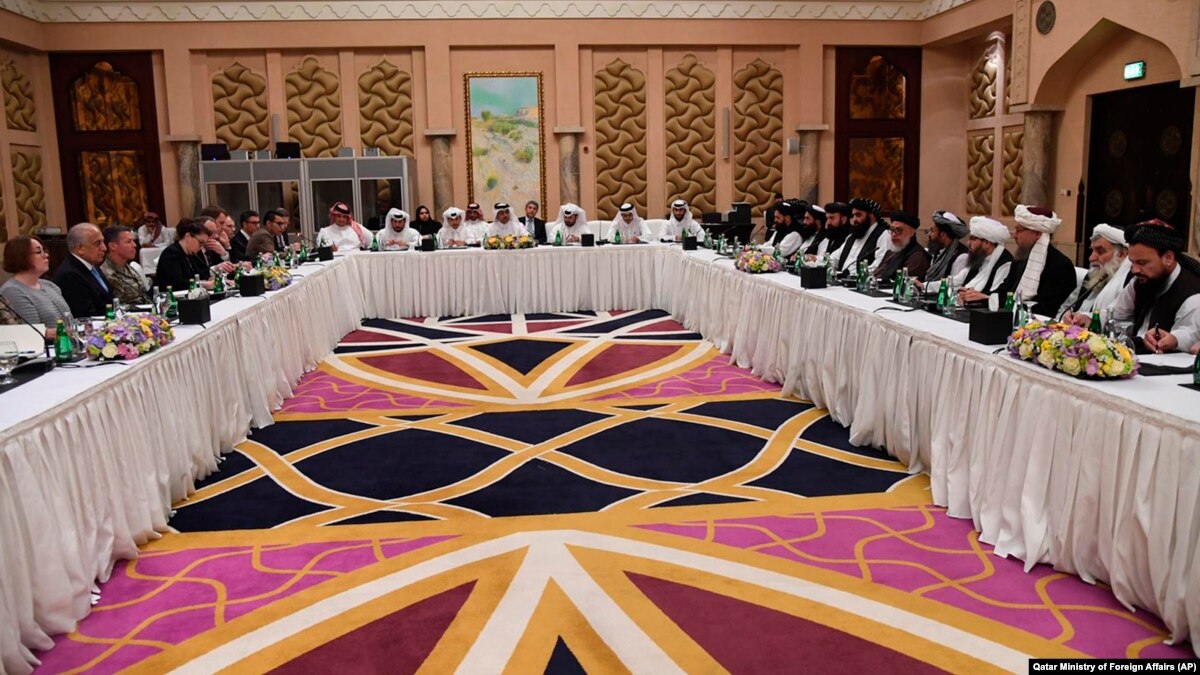
The Taliban says negotiations with the United States continued Wednesday in Qatar for a second day amid hopes of making further progress toward ending the conflict in Afghanistan.
A spokesman for the insurgent group noted that "technical groups" focused for a day-and-a-half until Wednesday afternoon on the withdrawal of U.S.-led international forces when they took up the issue of the Taliban guarantees to prevent Afghan soil from being used for terrorist attacks against America and its allies.
"Talks about preventing Afghanistan from harming others are currently under discussion," said Zabihullah Mujahid.
The two sides announced after their last meeting in Doha a month ago they had agreed "in principle" on a "framework" of discussions on the two key issues.
U.S. representative for Afghanistan reconciliation, Zalmay Khalilzad, is leading the American team, while Sher Muhammad Abbas Stanekzai is heading an "authoritative" team of Taliban negotiators.
'Paving the ground'
The ongoing meeting is expected to last for several days and is the fifth round of talks since late last summer when Washington directly engaged the Taliban in a dialogue that U.S. officials say is primarily aimed at paving the ground for a sustainable intra-Afghan peace process.
Khalilzad repeatedly clarified, however, that any final U.S. troop withdrawal plan would be linked to a Taliban cease-fire and the rebel group's direct talks with the government in Kabul. The insurgent group refuses to engage in talks with the Afghan government, though, insisting any discussions on internal Afghan matters must be decided by Afghans themselves.
At an informal session Monday hosted by Qatari officials prior to the formal negotiations, Taliban delegates were introduced to American interlocutors by Mullah Abdul Ghani Baradar, the newly appointed Taliban's deputy chief of political affairs and head of its Qatar-based office.
Baradar arrived in Doha a day before the two sides reconvened for the meeting, and his presence is seen as key to sustaining a productive dialogue with the U.S., according to insurgent officials.
The Taliban leader had been in detention in Pakistan since 2010 when a joint operation by local and U.S. intelligence operatives captured him in the city of Karachi while he was traveling through the neighboring country. He was released last October at the request of Khalilzad, meeting a key insurgent demand.
Baradar is known as a co-founder of the Taliban, and he is considered a highly respected figure in the rebel group. He is credited for organizing the insurgent campaign after the U.S.-led invasion of Afghanistan 17 years ago ousted the Taliban from power. Baradar continues to maintain influence over Taliban battlefield commanders, particularly in southern Afghan provinces, observers say.
US's Kushner Makes Little Headway on Mideast Peace Plan in Gulf
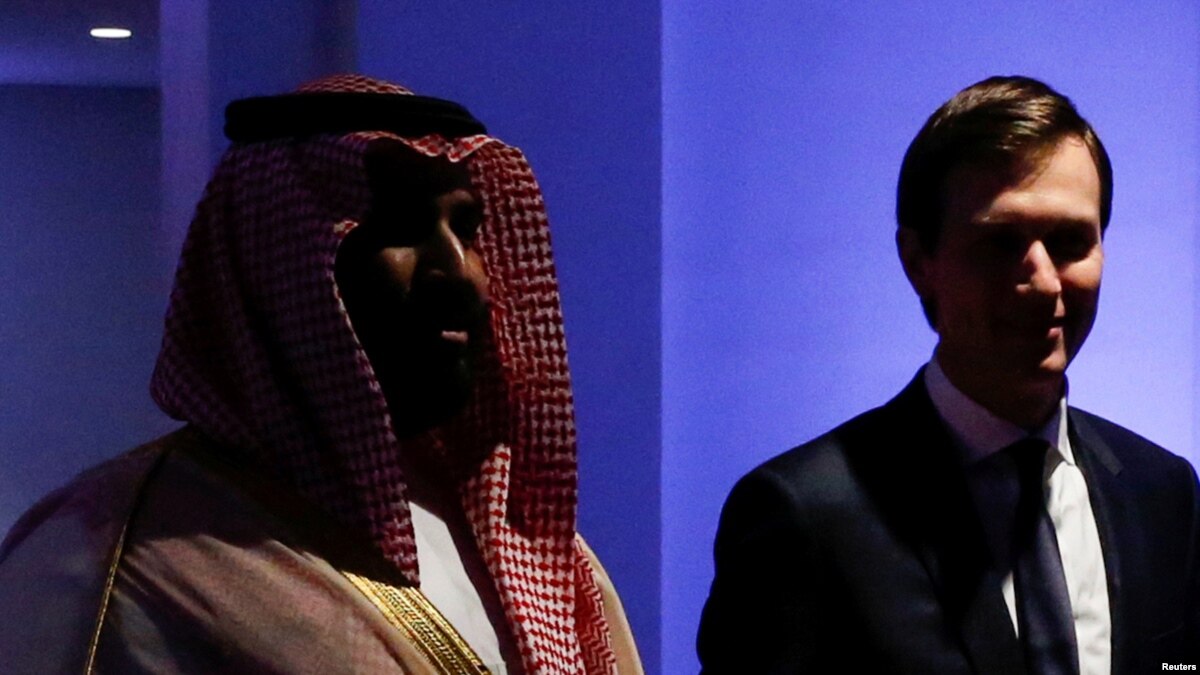
White House adviser Jared Kushner made a whirlwind visit this week to rally U.S.-allied Gulf Arab allies to support his still- unannounced Middle East peace plan, the leaked contours of which suggest little has been done to address Arab demands.
Kushner’s approach to ending the Israeli-Palestinian conflict does not appear to have progressed since his last regional tour in June, focusing largely on economic initiatives at the expense of a land-for-peace deal long central to the official Arab position, two sources in the Gulf told Reuters on Wednesday.
Palestinians have refused to discuss any peace blueprint with the United States in the wake of President Donald Trump’s recognition of Jerusalem as Israel’s capital in 2017, while some Arab leaders have publicly rejected any deal that fails to address Jerusalem’s status or refugees’ right of return.
Kushner, who is President Donald Trump’s son-in-law, met with leaders in the United Arab Emirates, Bahrain and Oman this week. He arrived in Turkey on Wednesday.
Three sources said Kushner had gone to Saudi Arabia on Tuesday although there was no official statement on the visit or his meetings with King Salman and Crown Prince Mohammed bin Salman. The Saudi media office did not respond to a request for comment.
One of the sources, who spoke on condition of anonymity, said the plan presented this week did not appear to take into consideration previously stated Arab demands on the status of Jerusalem, the right of Palestinian refugees to return and Israeli settlements in occupied territory.
Under the Arab Peace Initiative drawn up by Saudi Arabia in 2002, Arab nations offered Israel normal ties in return for a statehood deal with the Palestinians and full Israeli withdrawal from territory captured in 1967.
The source said Kushner, a real estate developer with little experience of international diplomacy or political negotiation, wanted to make a deal first and then agree on details.
The source added that the plan envisages a “substantial” financial contribution from Gulf states, but did not provide details.
ARAB CONCERNS
King Salman has dismissed Arab concerns that Saudi Arabia might back a U.S. deal that aligns with Israel on key issues, after the crown prince, who is close to Kushner, reportedly pressed Palestinian President Mahmoud Abbas to support the administration’s efforts.
Kushner’s meeting with Prince Mohammed on Tuesday was the first since the murder of prominent journalist Jamal Khashoggi by Saudi agents in the Saudi consulate in Istanbul last October sparked an outcry and tarnished the prince’s image.
Jordan, a U.S. ally where a majority of the population are descendants of Palestinians who fled during or after the creation of Israel in 1948, insists that no peace can be achieved without dealing with Jerusalem, where it serves as custodian of Muslim holy sites.
“The Americans are still in the process of presenting various ideas and scenarios but don’t appear to have arrived at final parameters of a plan,” said a second source in the Gulf region.
“They know that there are final-status issues that are non-starters for regional allies and the Palestinians alike,” the source added, referring to Saudi Arabia, Egypt and Jordan.
Kushner was given responsibility for Israel-Palestinian policy two years ago, but has still not provided concrete details of U.S. efforts, which Trump has dubbed “the deal of the century”.
Kushner said in an interview on Monday that Washington would present the peace plan only after Israel’s election on April 9, though previous targets have passed without any announcement.
He said it would build on past efforts — including the 1990s Oslo accords that provided a foundation for Palestinian statehood — and resolve borders and final-status issues. But he made no specific mention of a Palestinian state.
Israel has long rejected any return to what it has described as indefensible boundaries that existed before it captured the West Bank, East Jerusalem and the Gaza Strip in the 1967 Middle East war.
At Least 25 Killed in Locomotive Crash, Fire at Egypt's Central Cairo Station
[unable to retrieve full-text content]
At least 25 people were killed and dozens injured after a locomotive crashed into a platform at high speed at Cairo's main railway station on Wednesday, causing its fuel tank to explode. Read More At Least 25 Killed in Locomotive Crash, Fire at Egypt's Central Cairo Station : https://ift.tt/2BWhCGVAt Least 25 Killed Killed in Fiery Cairo Train Crash
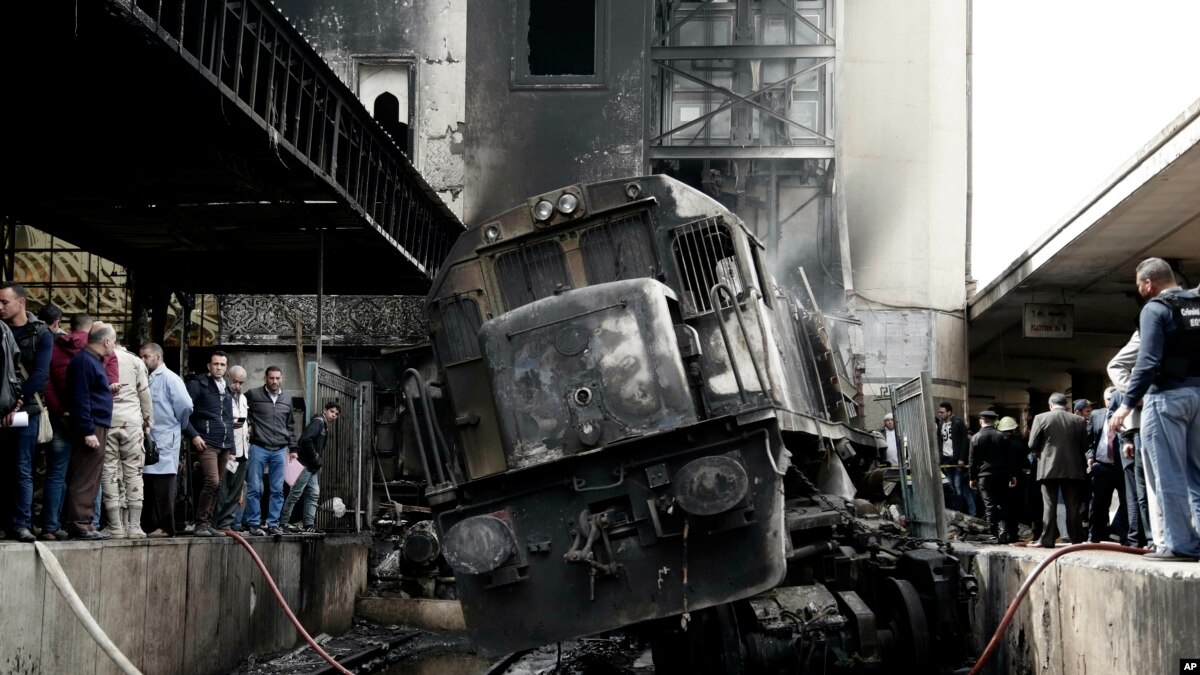
Egyptian media say more than 25 people were killed and dozens wounded Wednesday after a passenger train crashed into the platform at Cairo's main rail station. The impact caused a fuel tank on the platform to explode, setting fire to the train.
The accident at the Ramsis railway station set off a massive fireball, incinerating the front cars of the train and causing horrific burns to passengers and bystanders on the platform adjacent to the crash. Surveillance cameras captured the incident, showing bystanders on fire and running to escape the inferno.
One security camera showed a man, his body on fire, running down a set of stairs before collapsing. Rescue workers reported that many of the casualties were in critical condition, suffering severe burns.
Fire and rescue vehicles rushed to the scene during the morning rush hour. Fire crews doused the burning passenger cars, and many people inside the front cars were thought to have been incinerated by the fire and extreme heat of the blaze.
Prime Minister Mustapha Madbouli told reporters on the platform, after visiting the crash site, that every effort was being made to determine what happened.
He says the era of keeping silent and sweeping things under the rug has come to an end and the government will do its utmost to determine what happened and who was responsible, with a committee investigating the crash.
Witnesses say the train did not slow down as it approached the station. Egyptian railways are beset with frequent accidents due to brake failure and other incidents related to the antiquated state of signals, tracks, locomotives and passenger cars. The latest disaster led to the resignation of Egypt's transportation minister, Hisham Arafat.
Ashraf al Ashri, editor of Cairo's Al Ahram newspaper, told Al Arabiya TV that he believed that "both technical and human error were to blame" and that he suspected that the "brakes of the train may have failed, due to the speed at which the train approached the platform," before crashing.
Rouhani Rejects Resignation of FM Zarif
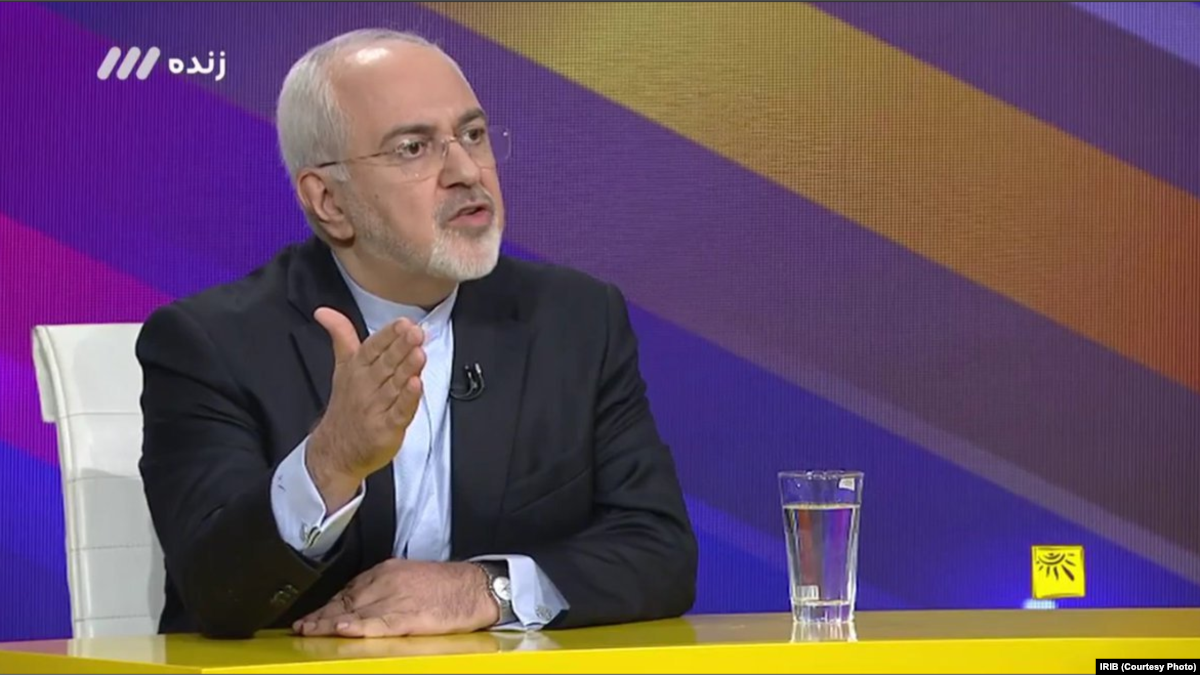
Iranian President Hassan Rouhani has rejected the resignation of Foreign Minister Mohammad Javad Zarif.
In a letter published Wednesday by state media, Rouhani says allowing Zarif's resignation to go ahead would be against the country's interests.
He added that Zarif is a key figure in what Rouhani called "resistance against broad pressures" by the United States.
Zarif gave no official reasoning for submitting his resignation Monday.
On Wednesday, he posted on Instagram a message over top of an Iranian flag that thanked Iranians for their support and said his focus is on elevating the work of the foreign ministry.
State media also showed Zarif taking part in the visit of Armenian Prime Minister Nikol Pashinyan in Tehran.
Islamic State Families in Syria Flee Group's Last Stronghold as “Caliphate” Fights to Death
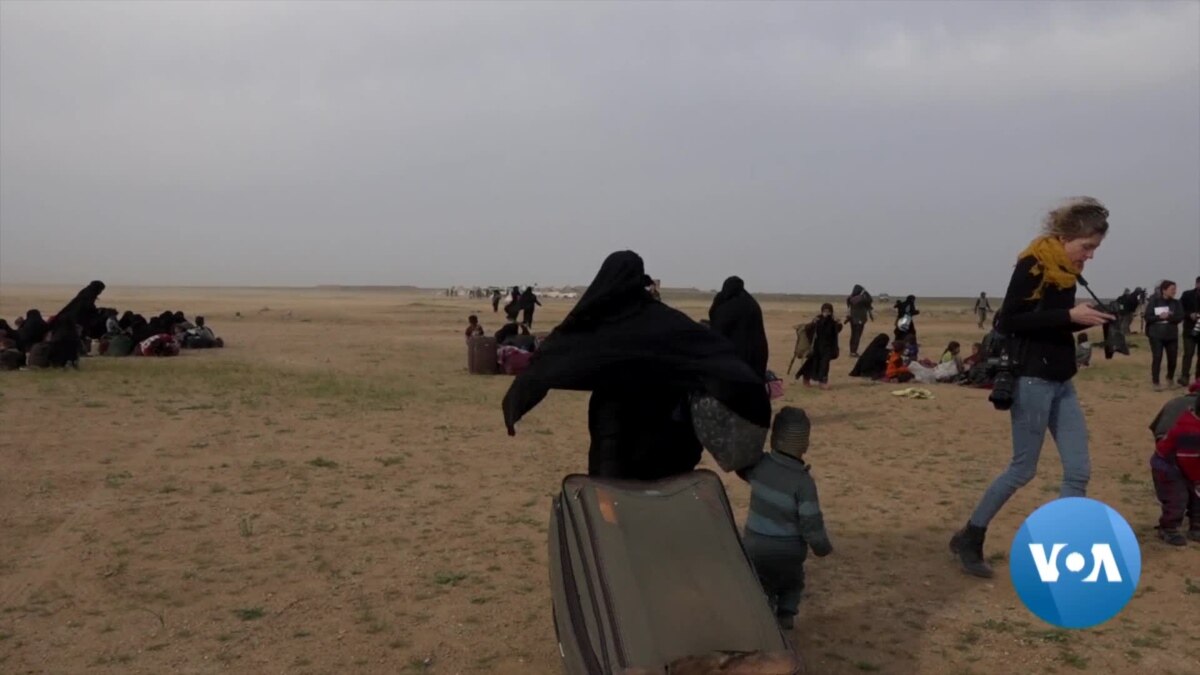
Coalition-backed Syrian forces are close to defeating the last Islamic State militant stronghold in Syria, but the battle is fierce as militants defend their web of tunnels inside a camp crowded with women and children. In recent days, thousands more people have poured out of the battle zone, some near death and others vowing that IS will fight on. VOA Middle East correspondent Heather Murdock is on the scene in Syria and has this report.
Read More Islamic State Families in Syria Flee Group's Last Stronghold as “Caliphate” Fights to Death : https://ift.tt/2GPUGwUTuesday, February 26, 2019
First Iranian-American Woman to Win Oscar Turns to Iran-Themed Films

The first Iranian-American woman to win an Oscar, Rayka Zehtabchi, says she wants to build on Sunday’s triumph of her documentary about menstruation by producing several films with Iran-related themes.
“I’m very interested in telling Iranian stories as well as women’s stories,” the 25-year-old Los Angeles-based filmmaker told VOA Persian in a Skype interview on Monday. “I was raised in Southern California pretty much my whole life, but the older I get, the more I feel like I connect with and learn about my Iranian culture.”
WATCH: Rayka Zehtabchi discusses being connected to her culture
Zehtabchi won the award for best documentary short at Sunday’s Academy Awards ceremony in Hollywood for "Period. End of Sentence." The Netflix-produced film is about women in rural India fighting the stigma surrounding menstruation by manufacturing sanitary pads to enable adolescent girls to stay in school while managing their periods.
Los Angeles high school students inspired the film by raising money to buy pad-making machines for the villagers of Hapur district, 90 kilometers east of the Indian capital, New Delhi. “Just seeing that there are these young people who care so deeply about this cause that is affecting women all over the world, and being a young woman myself, I felt compelled to jump on board,” Zehtabchi said.
Zehtabchi directed the film and shared the Oscar with American producer Melissa Berton.
Iranian-born British-American actress Nazanin Boniadi congratulated Zehtabchi on Twitter for being the first Iranian-American woman to achieve such a feat.
Watch: Rayka Zehtabchi, on being first Iranian-American Oscar winner
“It didn’t even cross my mind that I’d be the first Iranian-American woman to win an Oscar, but I feel absolutely incredible,” said Zehtabchi, the daughter of Iranian immigrants to the United States. “My dad passed away three years ago from lung cancer, and I wish he could have been there to see it, because he would have been very proud,” she added as her voice filled with emotion.
Watch: Rayka Zehtabchi, on her family's journey to U.S.
The filmmaker said one of her next productions will be a narrative feature about her family’s journey to the United States in the early 1990s. “I’m very interested in exploring the immigrant experience and how it could be devastating but also hilarious at times, being a foreigner in a new country and having to learn how to assimilate.”
Zehtabchi said she also is working on feature version of a 2016 short film that marked her directorial debut, "Madaran." Based on a true story about an Iranian mother who must decide whether to end or spare the life of her only son's killer at his execution, the original film qualified for Oscar contention in the Live Action Short category that year.
Watch: Rayka Zehtabchi's message to other young Iranian women
Asked for her message to other young women of Iranian origin who have cheered her success, she said: “You are strong and you are beautiful and you can do anything if you put your mind to it.”
This article originated in VOA’s Persian Service.
8 Facts: Yemenis 'Dying Every Day' as UN Makes Record Appeal
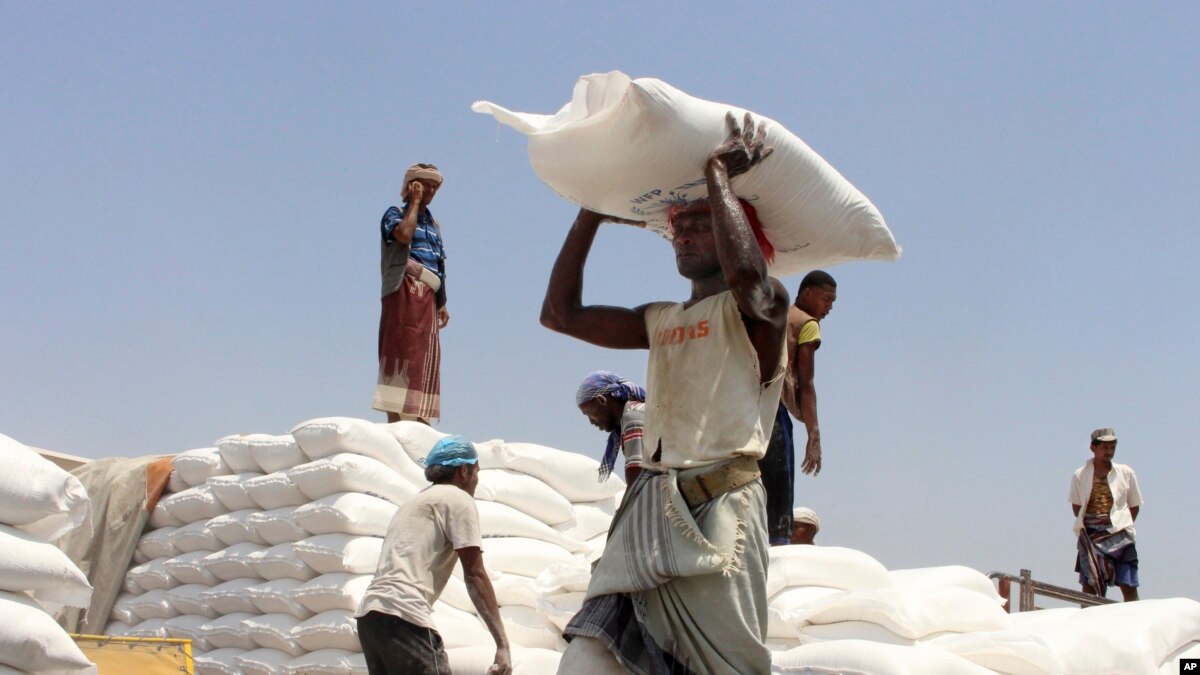
Donor pledges of $2.6 billion for Yemen fell "a long way" short of $4.2 billion requested by the United Nations on Tuesday for the world's worst humanitarian crisis, aid agencies said.
Aid agencies, including Save the Children and Oxfam, called for a ceasefire to help them reach more people in need in Yemen, where a proxy-war between Saudi Arabia and Iran has displaced millions and pushed them to the verge of starvation.
"Yemeni people ... are dying every single day this war continues," the charities said in a joint statement.
Here are eight facts about the war in Yemen:
1 - Some 24 million people in Yemen — almost 80 percent of the population — are likely to need humanitarian assistance in 2019.
2 - Tuesday's $4.2 billion pledging conference was the largest country appeal that the United Nations has ever launched.
3 - More than half of the funding for the U.N. appeal is for emergency food aid for 12 million people — a 50 per cent increase compared to last year.
4 - Almost 4.3 million people — or 15 percent of the population — have been forced to flee their homes since Yemen's civil war began in 2015, the majority remaining inside the country.
5 - More than 685,000 people have fled fighting along the west coast of Yemen since June.
6 - About 20 million people do not have enough to eat and almost half of these are "a step away from famine." the U.N.'s humanitarian chief Mark Lowcock said this month.
7 - Some 20 million people in Yemen lack access to adequate healthcare, and nearly 18 million do not have enough clean water or adequate sanitation.
8 - The United Nations has independently verified that more than 7,000 civilians have been killed and 11,000 injured in Yemen since 2015, although this is an underestimate as it cannot access some places and other casualties are not reported.
Sources: International Organization for Migration, CARE International, Save the Children International, Oxfam, Norwegian Refugee Council, UN-OCHA, Office of the United Nations High Commissioner for Human Rights.
Iran's Rouhani Stands by Moderate Ally Zarif After Surprise Resignation
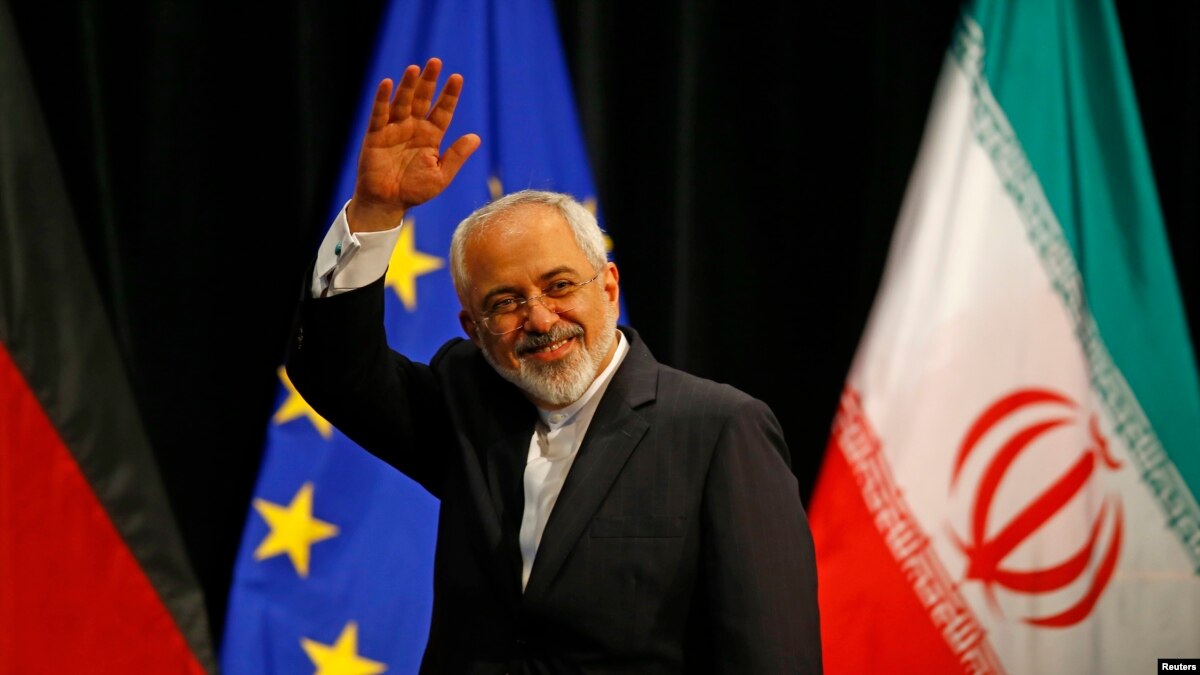
Iranian President Hassan Rouhani held back from accepting the resignation of his foreign minister on Tuesday, standing by a moderate ally long targeted by hardliners in internal factional struggles over a 2015 nuclear deal with the West.
The minister, Mohammed Javad Zarif - a U.S.-educated veteran diplomat who helped craft the pact that curbed Iran’s nuclear program in return for sanctions relief - gave no reason for his decision to quit when he announced it on Instagram on Monday.
But his move thrust the schism between Iran’s hardliners and moderates into the open, effectively challenging Supreme Leader Ayatollah Ali Khamenei to pick a side.
An ally of Zarif said his resignation was motivated by criticism of the nuclear accord, under increasingly intense fire in Iran since the United States abandoned it last year.
“There were closed-door meetings every week, where top officials were bombarding him with questions about the deal and what will happen next and so on,” a Zarif ally told Reuters on condition of anonymity. “He and his boss (Rouhani) were under a huge amount of pressure.”
Since the United States walked out of the nuclear deal and reimposed sanctions last year, Rouhani has had to explain why Iran has continued to abide by its restrictions while reaping virtually none of the foreseen economic benefits.
Despite announcing his resignation, Zarif had not officially tendered it to Rouhani by Tuesday afternoon and the president had not accepted it.
Iran’s Foreign Ministry reiterated that Rouhani had not accepted Zarif’s resignation, rejecting reports in the media.
In an apparently related development, an oil ministry spokesman said Oil Minister Bijan Zanganeh is not resigning, according to the Iranian Students’ News Agency (ISNA). Like Zarif, Zanganeh is regarded as a moderate.
“Wise and effective positions”
“All interpretations and analysis around the reasons behind the resignation of Foreign Minister Mohammad Javad Zarif, beyond what he posted on his Instagram account, are not accurate and, as the chief of staff of the president of Iran said today, the resignation has not been accepted,” spokesman Bahram Qasemi was quoted as saying by Fars news.
Lawmakers representing the majority moderate faction sent Rouhani a letter asking him to keep Zarif on, IRNA reported.
Rouhani’s chief of staff Mahmoud Vaezi said Rouhani stood by Zarif. The president’s praise was “a clear sign of the satisfaction of the representative of the people of Iran about the wise and effective positions and work of Dr Zarif,” Vaezi wrote on Instagram.
Lawmaker Ali Motahari, like other politicians from both camps, said Rouhani was unlikely to accept Zarif’s decision since no one else could fill the demanding post.
The schism between hardliners and moderates over the nuclear deal shows the tension in Iran between the two factions, and between the elected government which runs the country on a day-to-day basis and a clerical establishment with ultimate power.
Rouhani won elections in 2013 and 2017 on reform promises, while Khamenei, in power since 1989, is seen as above factional infighting but sympathetic to hardliners. While Rouhani chooses ministers, Khamenei traditionally has the last say.
Uncertainty
“If he (Khamenei) publicly backs Zarif and Rouhani, this crisis will be over in a good way and it will narrow the gap between different political camps in the country,” said an official close to the hardline camp.
The political uncertainty comes at a difficult time for Iran’s leaders as the reimposed U.S. sanctions have dashed hopes of an economic breakthrough. Rouhani has warned that the country is facing the worst economic crisis in 40 years.
Hardships have triggered waves of nation-wide protests, with calls for both Rouhani and clerical leaders to step down.
Some unconfirmed Iranian media reports indicated Zarif had resigned because he had not been informed about a visit by Syrian President Bashar al-Assad on Monday.
Zarif was quoted as condemning “factional fighting” in a newspaper interview published on Tuesday - suggesting political tensions may have played a part in his decision. The Fars news agency reported that the interview had taken place last week, before Zarif’s resignation.
Slideshow (3 Images)
A former pro-reform official warned of dire consequences of Zarif’s resignation is accepted.
“If accepted, it will have a domino effect ... and others (ministers) and even Rouhani might follow him and this is not something that the country can tolerate when pressured by America and sanctions,” he said.
“Hardliners will be strengthened and any kind of reform will be buried for at least 10 years.”
Read More Iran's Rouhani Stands by Moderate Ally Zarif After Surprise Resignation : https://ift.tt/2GLeQIrAmnesty: Impunity Emboldens Mideast Rights Violations
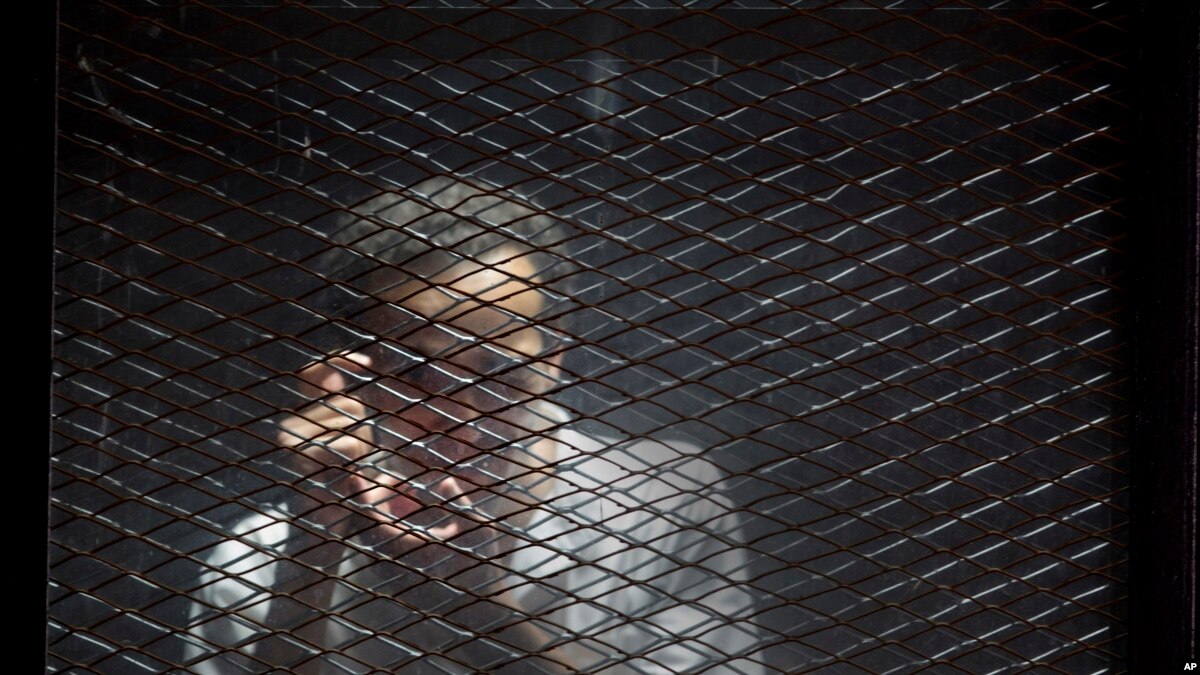
The world community's "chilling complacency toward wide-scale human rights violations" in the Middle East and North Africa emboldened governments to commit "appalling" violations last year, Amnesty International said Tuesday.
The group's annual survey of the human rights situation in the region, released in Beirut, said ongoing crackdowns on dissent and civil society "intensified significantly" in Egypt, Iran and Saudi Arabia.
It also cited the killing of journalist Jamal Khashoggi by Saudi agents in the kingdom's consulate in Istanbul in October, saying it "has not been followed by concrete action to ensure those responsible are brought to justice."
Amnesty said Khashoggi's killing prompted rare action from countries such as Denmark and Finland to suspend the supply of arms to Saudi Arabia. It added that Saudi Arabia's main allies, including the U.S., Britain and France "have taken no such action and, as a whole, the international community has failed to meet demands by human rights organizations for an independent U.N. investigation capable of delivering justice."
Amnesty called on all countries to immediately suspend the sale or transfer of arms to Israel and the warring sides in Yemen "until there is no longer substantial risk that such equipment could be used to commit" violations.
The conflict in Yemen began with the 2014 takeover of the capital, Sanaa, by the Iran-backed Houthis, who toppled the government of Abed Rabbo Mansour Hadi. A Saudi-led coalition allied with Hadi's internationally recognized government has been fighting the Houthis since 2015.
The fighting in the Arab world's poorest country has killed thousands of civilians, left millions suffering from food and medical care shortages, and pushed the country to the brink of famine.
"It took Jamal Khashoggi's cold-blooded murder inside a consulate to prompt a handful of more responsible states to suspend arms transfers to a country that has been leading a coalition responsible for war crimes and has helped create a humanitarian catastrophe in Yemen," said Heba Morayef, Regional Director for the Middle East and North Africa at Amnesty International.
In Iran, 2018 was designated by Amnesty International as a "year of shame" after authorities arrested more than 7,000 protesters, students, journalists and others, many arbitrarily.
In Saudi Arabia, authorities arrested and prosecuted government critics, academics and human rights defenders. In a wave of arrests in May 2018, at least eight women human rights defenders who had campaigned against the ban on women drivers and the guardianship system were detained without charge.
"Virtually all human rights defenders in Saudi Arabia are now behind bars or have been forced to flee the country," Amnesty said.
In Egypt, authorities intensified their crackdown on dissent in the run-up to presidential elections.
In Syria, the government disclosed the death of some of those subjected to enforced disappearance in previous years by updating civil status records, but failed to provide the families with remains, it said. Tens of thousands of people, including peaceful activists and government opponents, humanitarian workers, lawyers and journalists remained disappeared.
Philip Luther, research and advocacy director for the Middle East and North Africa at Amnesty, said allies of governments in the region put lucrative business deals, security co-operation or billions of dollars' worth of arms sales ahead of civil rights concerns "time and again."
Monday, February 25, 2019
Shopping Street Rises From the Ashes of War in Libya's Benghazi
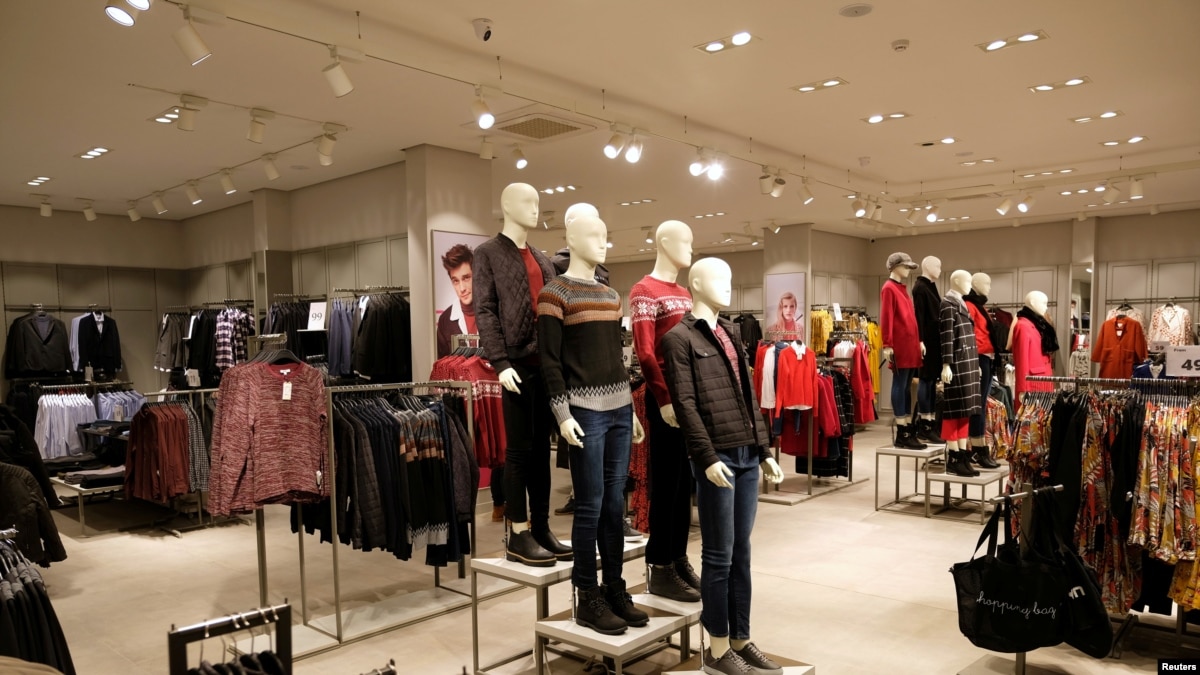
The old center of Benghazi lies in ruins but one shopping street has sprung up in the war-ravaged Libyan city, with sportswear and fashion stores that would not be out of place in Dubai or Istanbul.
Foreign brands are tapping into residents' desire to enjoy shopping again after a three-year city war when their minds were concentrated on getting fuel or moving to safer areas.
Imports were limited as fighting between Khalifa Haftar's Libyan National Army and his mostly Islamist opponents forced Benghazi's port to close.
But with the end of conflict in 2017, shops have returned and Venice Street, with its trendy new stores and elegant cafes, has brought back a level of wealthy consumerism.
That contrasts with much of the city where some buildings still show bullet holes from World War II, when Benghazi changed hands between British and German troops.
Former leader Moammar Gadhafi neglected eastern Libya, where Benghazi is located, during his 42 years in power in punishment for political opposition there, and what is now Venice Street was mostly wasteland until his overthrow in 2011.
Residents have money in their bank accounts, as most work for the state, but not necessarily cash as there is a shortage of bank notes.
"It's good that some traders started accepting checks," said Mustafa Bazara, shopping with his sister for shirts. Checks are accepted in some shops at a premium as they can usually only be cashed on the black market for a fee.
Ahmed al-Orfy, who runs a new fashion store, said he had high hopes for Venice street: "We have security and the ambition to be on same level as the Champs-Elysees."
($1 = 1.3849 Libyan dinars)
France's Macron Welcomes US Reversal on Keeping Troops in Syria
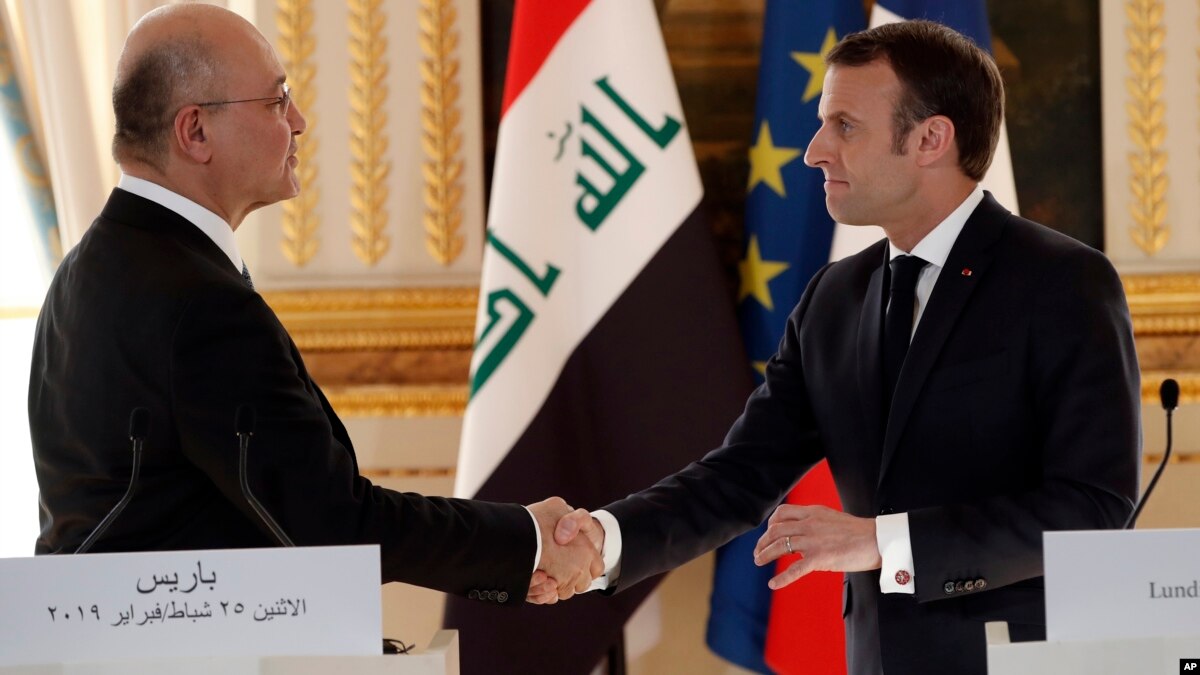
French President Emmanuel Macron on Monday welcomed the United States' decision to leave American troops in Syria, a reversal by U.S. President Donald Trump that came after an outcry from coalition allies such as France.
"On the U.S. decision, I can only but welcome this choice," Macron told a news conference with his Iraqi counterpart Barham Salih. "The U.S. decision is a good thing. We will continue to operate in the region within the coalition."
In December, Trump ordered the withdrawal of all 2,000 troops in Syria after he said they had defeated Islamic State militants, an abrupt decision that sparked consternation among allies and was a factor in his defense secretary's resignation.
Macron had personally sought to convince Trump to maintain troops in Syria, French diplomats said at the time, warning him about the risks of pulling out too early.
The United States will leave about 400 U.S. troops split between two different regions of Syria, a senior administration official said last Friday.
Iran's Foreign Minister Zarif, Architect of Nuclear Deal, Resigns
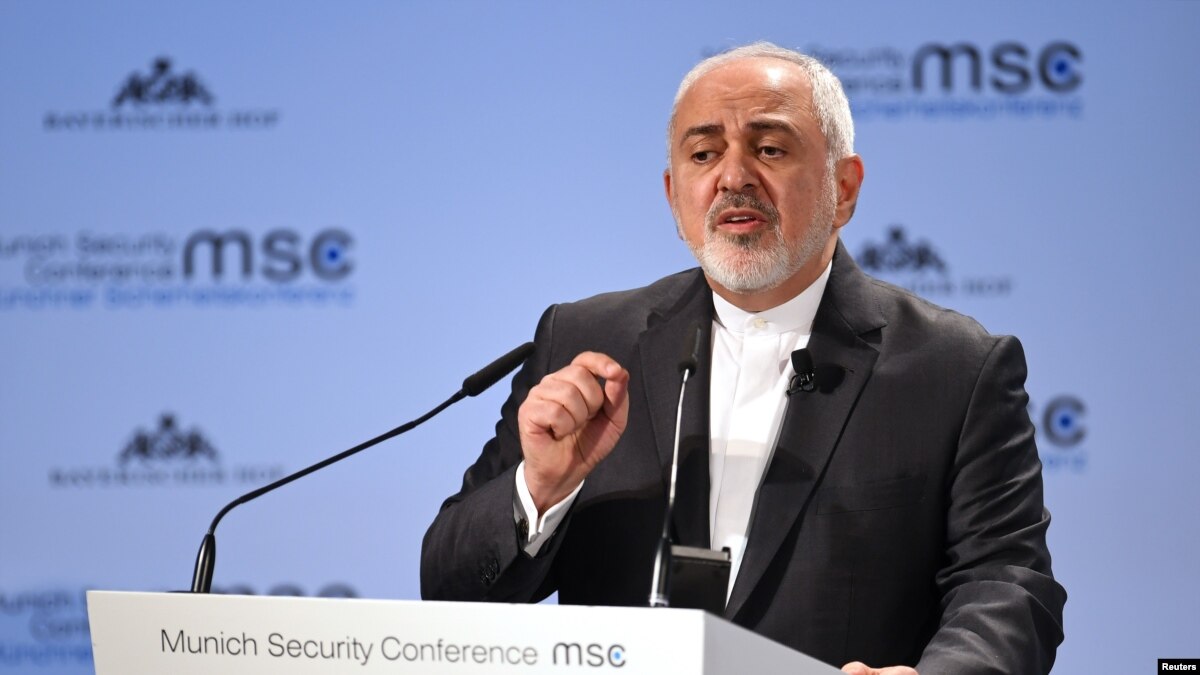
Iran's Foreign Minister Mohammad Javad Zarif, the urbane, U.S.-educated architect of its 2015 nuclear deal with world powers, announced his resignation unexpectedly on Monday on Instagram.
"Many thanks for the generosity of the dear and brave people of Iran and its authorities over the past 67 months. I sincerely apologise for the inability to continue serving and for all the shortcomings during my service. Be happy and worthy," he wrote on his Instagram page jzarif_ir.
He gave no specific reasons for his decision.
Zarif played the lead role in striking the deal under which Iran agreed to curbs on its nuclear program in return for the lifting of international financial sanctions.
He came under attack from anti-Western hardliners in Iran after the United States pulled out of the agreement last May and reimposed sanctions.
A spokesman for the Iranian mission to the United Nations, Alireza Miryousefi, confirmed the announcement of the resignation. However there was no immediate word on whether President Hassan Rouhani would accept it.
Iran's semi-official Tasnim news agency said "some sources have confirmed Zarif's resignation."
Born in 1960, Zarif lived in the United States from the age of 17 as a student in San Francisco and Denver, and subsequently as a diplomat to the United Nations in New York, where he served as Iranian ambassador from 2002 to 2007.
He was appointed minister of foreign affairs in August 2013 after Rouhani won the presidency in a landslide on a promise to open up Iran to the outside world.
Since taking charge of Iran's nuclear talks with major powers in late 2013, Zarif has been summoned to the parliament several times by hardline lawmakers to explain about the negotiations.
In February 2014 he caused an uproar with public comments condemning the Holocaust and was subsequently summoned to parliament. Holocaust denial has been a staple of public speeches in Iran for decades.
Some hardliners even threatened Zarif with bodily harm after the nuclear deal was signed. Iran's top authority, Supreme Leader Ayatollah Ali Khamenei, guardedly backed the deal.
Rami Malek's Relatives in Egypt Celebrate His Oscar Victory
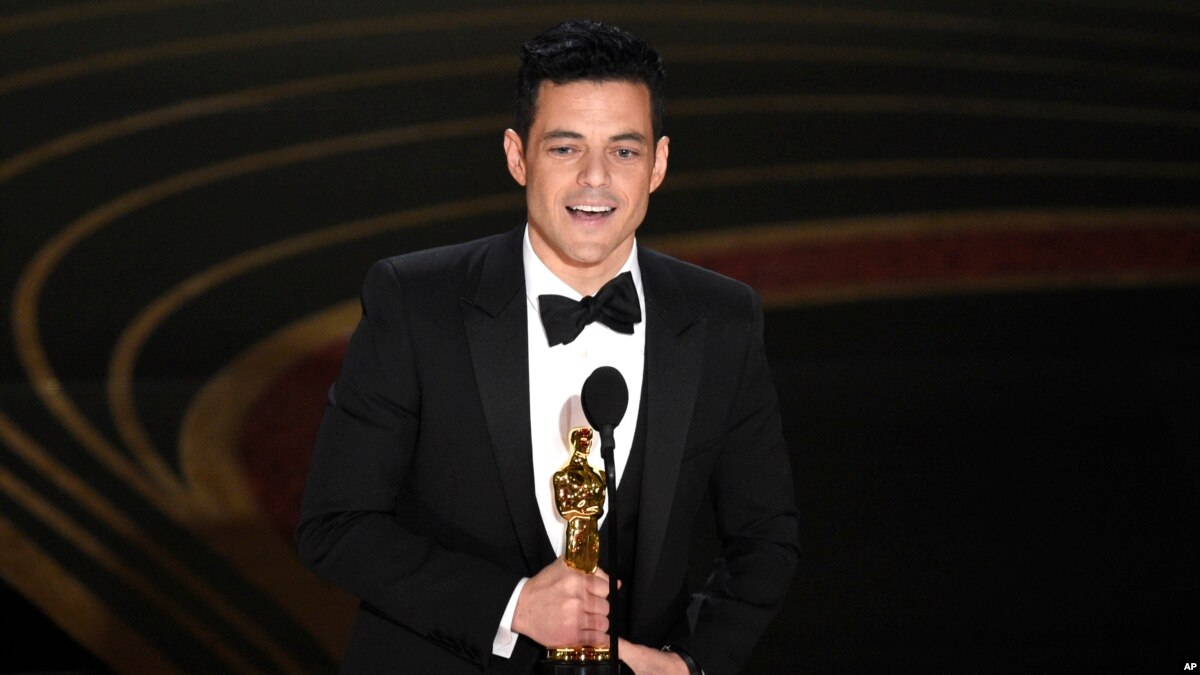
Rami Malek's relatives in Egypt huddled around a TV set at home as if cheering the national soccer team, but they were celebrating his first best actor Oscar for his role in Bohemian Rhapsody.
Malek's 24-year-old cousin, Fadi, said uncles, aunts and their children had gathered at the family house in the hamlet of Feltaous in Minya province, 265 km (165 miles) south of Cairo, to watch the Academy Awards live from Los Angeles.
When Malek's name was announced as best actor, the family erupted in jubilation, hugging each other and dancing for joy.
"It was like watching Egypt score a goal to win the cup," Fadi told Reuters by telephone from Feltaous. "It wasn't a win for the family only, but also for Egypt."
The family called Malek's mother in the United States to congratulate her on the honor and invite their celebrity cousin to visit Egypt.
"Auntie Nelly [Rami's mother] said she and Rami were eager to visit," said Rami, another cousin of Malek, a Los Angeles native of Egyptian descent.
Malek, 37, had emerged as a favorite for the Oscar in recent weeks after winning Golden Globe, Screen Actors Guild and British BAFTA awards for playing late frontman Freddie Mercury of British rock band Queen in Bohemian Rhapsody.
In his acceptance speech, Malek noted that he was "the son of immigrants from Egypt. ... I'm a first-generation American and part of my story is being written right now," he said to applause.
Rami, who is also in his 30s, said Malek's talents were evident when he visited Egypt as a high school student back in the 1990s for the first time since his family emigrated to the United States in 1979.
"I did not imagine then that Rami would become a world-famous actor, but he clearly loved acting," Rami said.
Trump: US Citizen Detained in Yemen 'Reunited' With Family
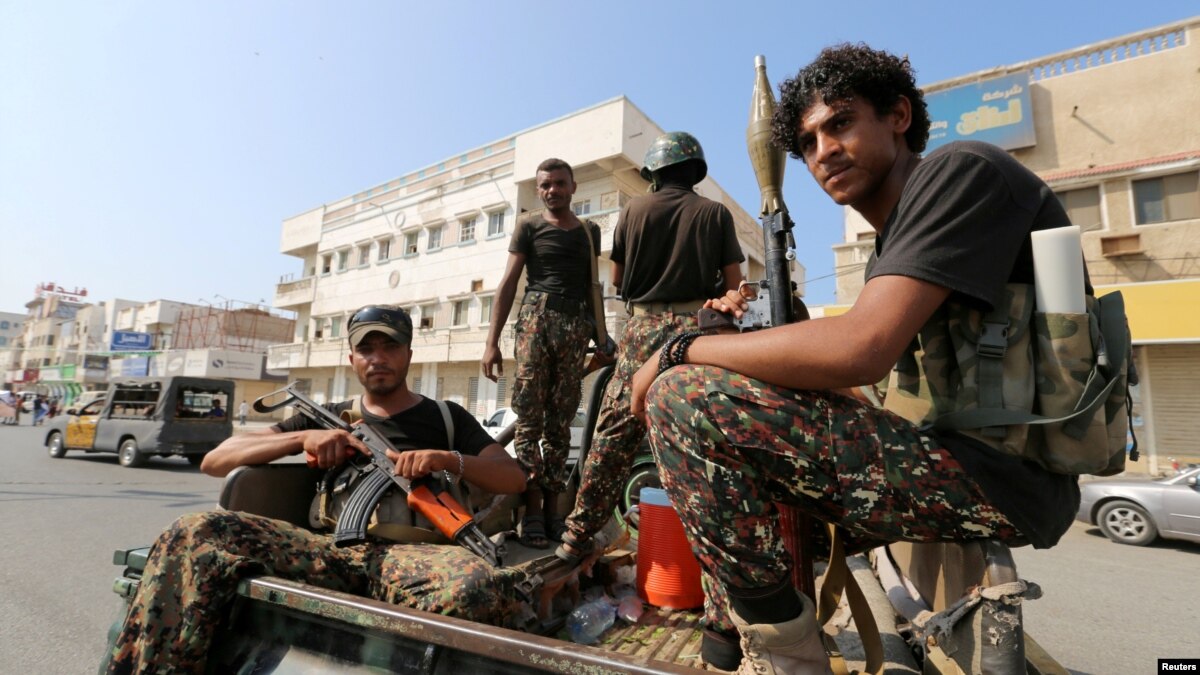
U.S. President Donald Trump said Monday that American citizen Danny Burch has been reunited with his family and praised the United Arab Emirates for its role in "bringing Danny home."
In September 2017, Burch was detained in Yemen and had been held by the country's Houthi group until January 2018, when he was released and taken to Oman.
UAE Says its First Astronaut Going Into Space in September
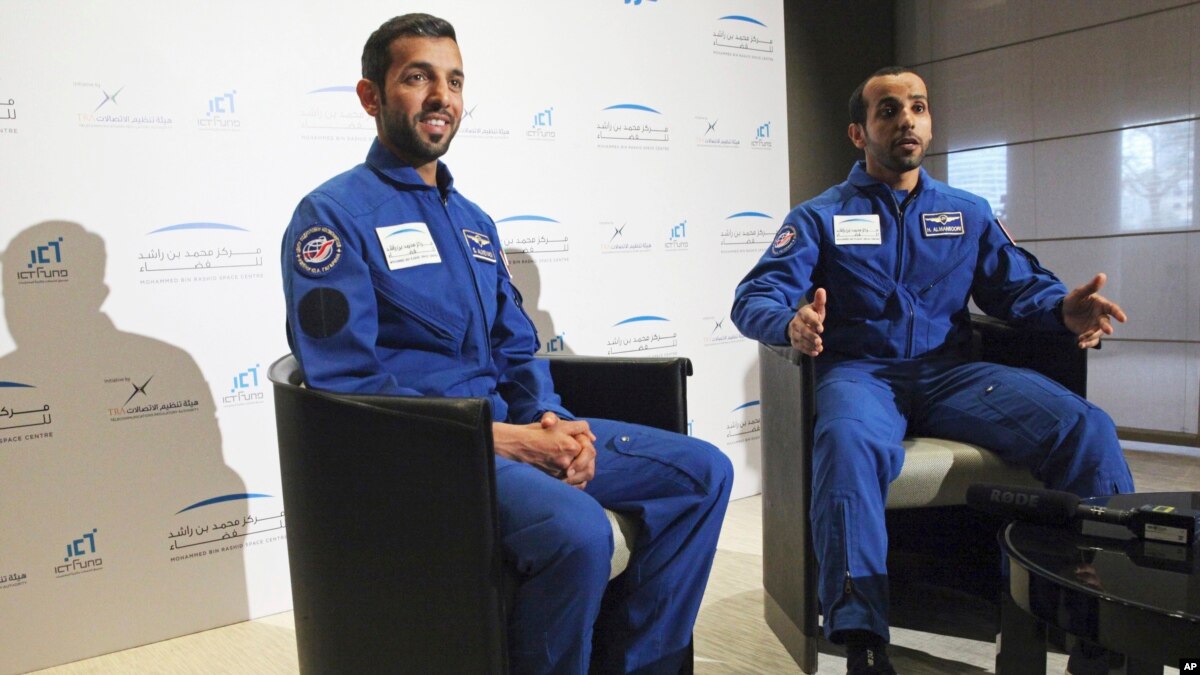
The first astronaut from the United Arab Emirates will blast off into space on Sept. 25 on a trip to the International Space Station, authorities announced Monday.
Either military pilot Hazza al-Mansoori or engineer Sultan al-Neyadi will be the first Emirati in space, part of an ambitious space program for this Gulf Arab nation home to the world’s tallest building and the busiest airport for international travel.
But the two men, selected from over 4,000 applicants, say they aren’t worried after the recent failure of another Russian rocket carrying astronauts to the space station.
“After the incident we were more confident with the preparedness of the mission,” al-Mansoori told The Associated Press. “In case of any failure there is equipment onboard the rocket to ensure the safety of the crew, which made us more confident that the system works with a high level of adequacy.”
That incident happened Oct. 11, which saw a Soyuz-FG rocket carrying U.S. astronaut Nick Hague and Russian cosmonaut Alexei Ovchinin fail shortly after launch due to a damaged sensor. The two men landed safely in Kazakhstan.
“The astronauts who were involved will go into space soon,” al-Neyadi said. “This shows how safe the Soyuz is, that astronauts are able to survive in case of any accident.”
Both men have undergone intensive training at the Star City space center outside of Moscow, which included pressure chamber tests, centrifuge tests, parabolic flight training, and winter survival training. Parabolic flights allow astronauts to train for being weightless in space.
“Since I’m a pilot, I was able to withstand a gravitational force of 9-G,” al-Mansoori said. “Now I must train in this sort of gravitational force, 0-G, the lack of gravity.”
Al-Neyadi said the biggest challenge he faced was not a physical one.
“The most difficult thing perhaps was learning Russian, since it’s the only language which we will use to communicate with the crew onboard the vessel,” he told the AP. “It was also the language they used while training at the center in Russia.”
The Russian Soyuz spacecraft is currently the only vehicle that can ferry crews to the International Space Station after the U.S. space shuttle fleet retired.
Organizers had said they’d announce the name of the astronaut going Monday. They didn’t, without offering an explanation. It remains unclear when authorities will choose the first astronaut to go in September.
The first astronaut will travel in September with the Russian space mission aboard Soyuz MS-15 and spend eight days at the International Space Station. The selected astronaut will return onboard the Soyuz MS-12 and then be replaced by the second astronaut.
The UAE has a fledgling space program with big ambitions. It launched its first locally made satellite, KhalifaSat, in October from Japan. It also wants to launch a probe to Mars in 2020.
The UAE also says it wants to colonize Mars by 2117, with a fully functioning city of 600,000.
Though the men will be over 400 kilometers (250 miles) above the Earth’s surface while on their trip, the Emirati astronauts will have a taste of home when they travel closer to the stars. Russia’s state-owned RIA Novosti news agency quoted an unnamed industry source saying that UAE space travelers have been offered a menu of Arab dishes to select from when they go into space. The men have chosen maqloubeh, a one-pot rice dish, salona, a lamb stew, and the standard hummus, the agency reported.
Afghanistan Begins Exports To India Through Iranian Port
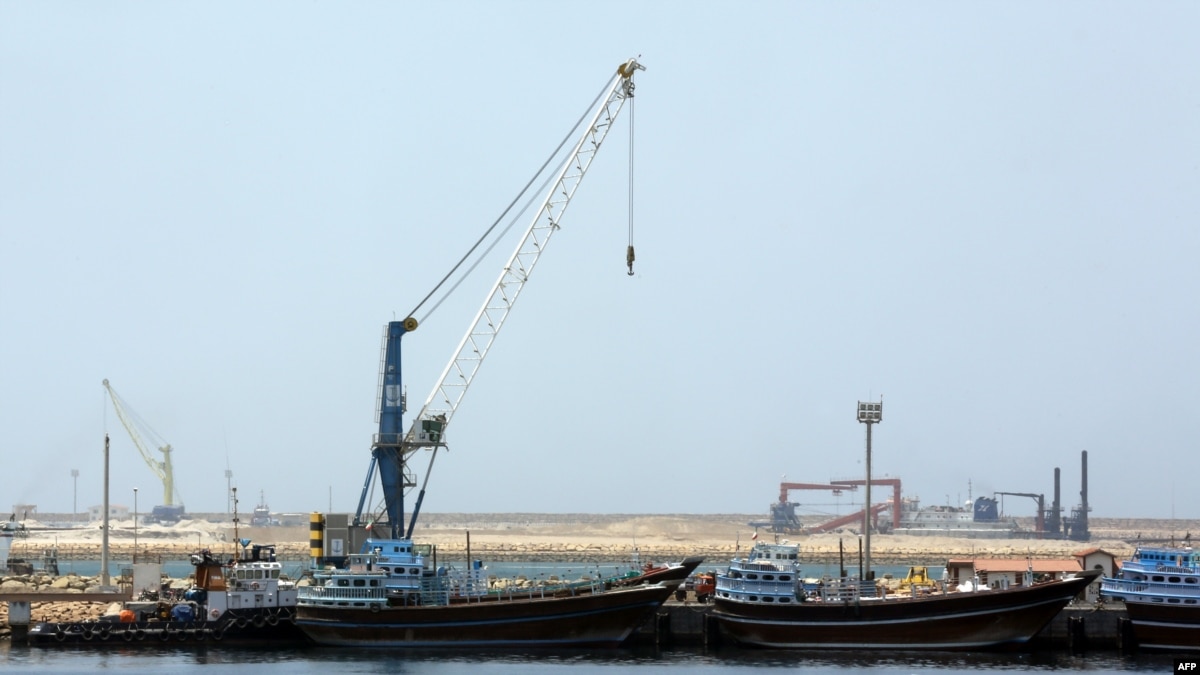
Afghanistan has started shipping goods to India for the first time through a newly developed Iranian seaport in a bid to improve exports and reduce reliance on routes through its uneasy neighbor, Pakistan.
Afghan President Ashraf Ghani traveled Sunday to the western border city of Zaranj to see off the inaugural convoy of 23 trucks loaded with 570 tons of cargo to the Chabahar port in neighboring Iran. The consignment is destined for the Indian port city of Mumbai.
For decades, landlocked Afghanistan has mostly relied on Pakistani land and seaports for international trade. But mutual tensions have in recent years significantly reduced Afghan trade and transit activities through Pakistan.
Addressing the nationally televised ceremony, Ghani credited a “healthy cooperation between India, Iran and Afghanistan” for achieving the milestone. He said the new export route will help improve economic growth in his war-shattered country, saying "Afghanistan is not landlocked anymore."
New Delhi has financed and developed Iran’s Chabahar Port to enable Kabul get direct and easy sea trade access.
India took operational control of a portion of the Iranian port late last year for 18 months and plans to send cargo ships from its ports of Mumbai, Kandla and Mundra every two weeks, according Indian media reports.
The United States last year waived certain anti-Iran sanctions to allow development of Chabahar to support efforts aimed at stabilizing Afghanistan. The waiver has enable India, Iran and Afghanistan to continue their work to establish a new transit and transport corridor linking the three countries to help improve Afghan economy and allow the war-ravaged country to import food and medicines.
India successfully shipped 1.1 million tons of wheat to Afghanistan through Chabahar Port in 2017. That year, New Delhi also launched an air corridor with Kabul for bilateral trade.
Indian ambassador to Afghanistan, Vinay Kumar, while addressing Sunday’s ceremony in Zaranj said the air corridor has since helped increased Afghan exports to his country by 40 percent.
China also opened an air corridor with Afghanistan in November and has since imported thousands of tons of Afghan pine nuts, bringing much-need foreign exchange to Kabul. Afghanistan is the largest producer of pine nuts in the world, with an annual output of about 23,000 tons. The increase in exports to China has led to an unusual rise in in prices of pine nuts in Afghanistan, say local traders and consumers.
Pakistan allows Afghanistan to use its seaports for international trade under a bilateral trade and transit agreement. It also allows use of overland routes for Afghan exports to India. However, Islamabad wants improvement in ties with New Delhi before it will allow Indian exports via the same routes back to Afghanistan.
Sunday, February 24, 2019
Saturday, February 23, 2019
US-Backed Syrian Forces Hand Over 150 IS Militants to Iraq
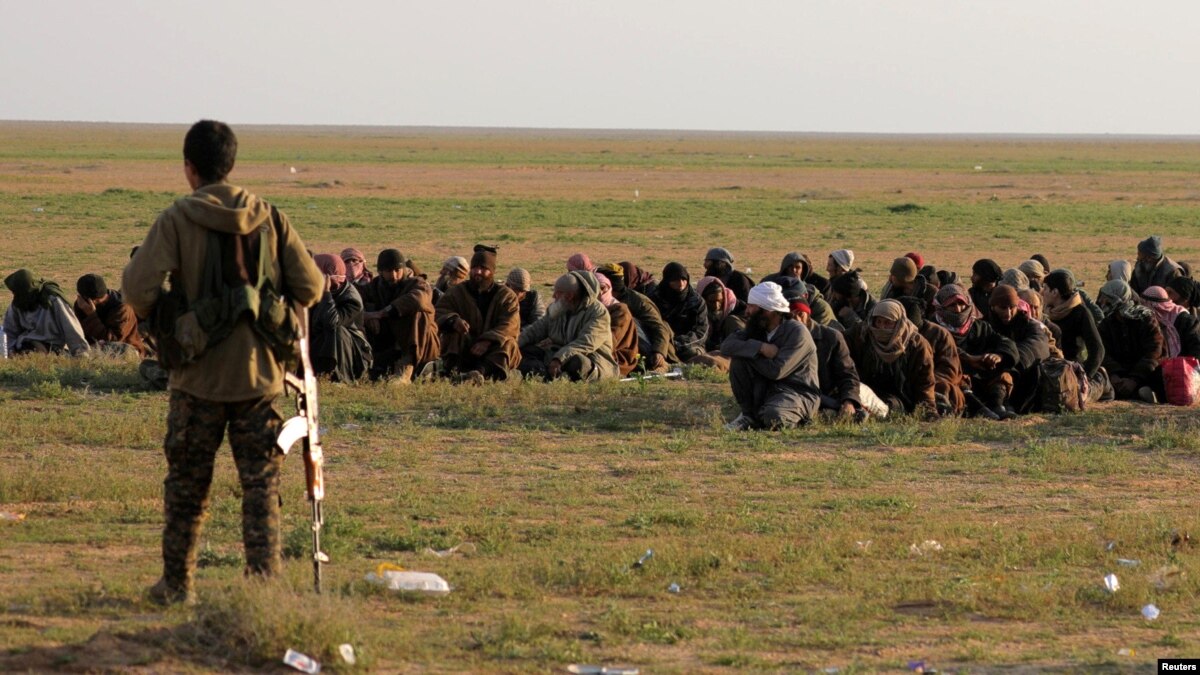
Iraqi security officials say they have received custody of a second batch of 150 Iraqi Islamic State fighters from U.S.-backed forces in Syria.
Two officials, speaking on the condition of anonymity because of media regulations, said the Syrian Democratic Forces handed over Iraqi nationals on Saturday night.
The fighters will be interrogated about their participation with the jihadist group, the officials said.
The SDF has told Iraqi authorities it has captured 650 Iraqi militants in the fighting for Baghouz, an IS-held village in eastern Syria, according to the officials.
On Thursday, the SDF handed over 150 militants, in the first significant transfer to Iraq.
Iraqi Prime Minister Adel Abdul-Mahdi has said Iraq is also preparing to receive thousands of Iraqi women and children living in SDF camps in Syria.
Saudi Arabia Names Princess as New US Ambassador
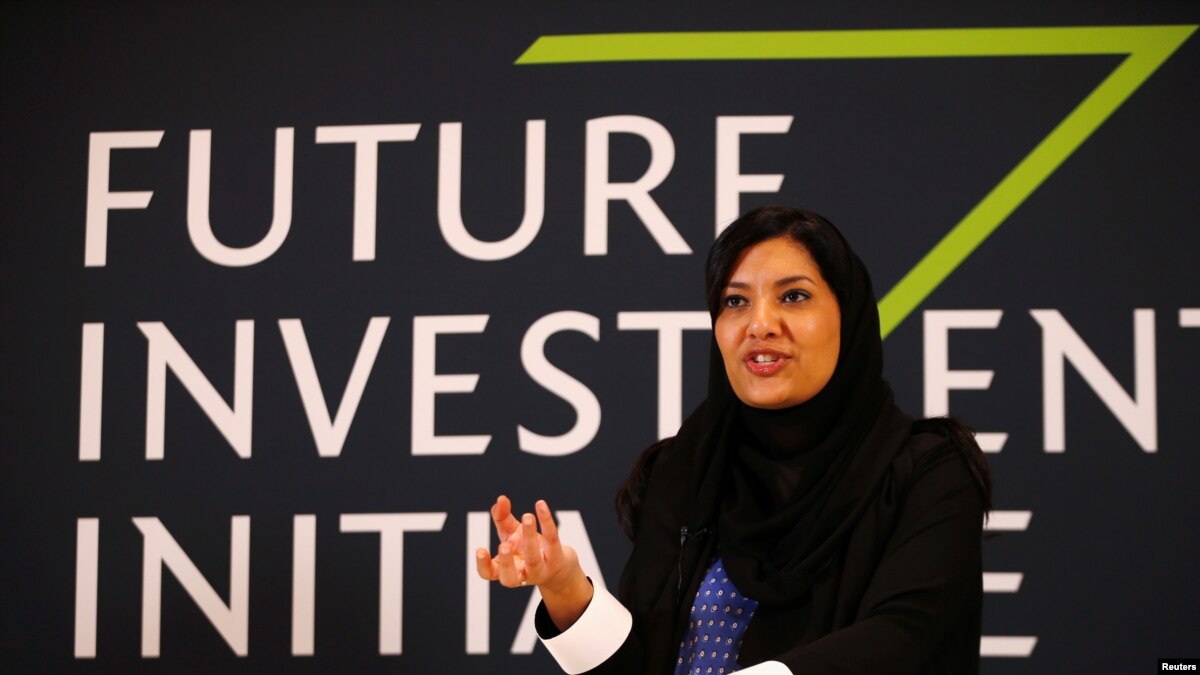
Saudi Arabia has replaced its ambassador to the United States, a royal decree announced Saturday, as the fallout over journalist Jamal Khashoggi's murder tests relations between the two allies.
Princess Reema bint Bandar was appointed the kingdom's first woman envoy to Washington, replacing Prince Khalid bin Salman, who was named vice defense minister.
Prince Khalid is the younger brother of Crown Prince Mohammed bin Salman, the country's de facto ruler who also serves as the defense minister.
The reshuffle comes as ties with Washington are under strain following Khashoggi's murder last October in the Saudi consulate in Istanbul.
After initially denying they knew anything of Khashoggi's disappearance, the Saudis finally acknowledged that a team killed him inside the consulate, but described it as a rogue operation.
U.S. lawmakers have threatened to take tougher action against Saudi Arabia over the brutal killing amid claims that the crown prince was personally responsible.
The Saudi government has strongly denied he had anything to do with the murder of Khashoggi who was a columnist with The Washington Post.
The killing refocused attention on a Saudi-led military coalition's bombing campaign in Yemen, which is gripped by what the UN calls the world's worst humanitarian crisis.
Earlier this month, the U.S. House voted overwhelmingly to end American involvement in Saudi Arabia's war effort in neighboring Yemen, dealing a rebuke to President Donald Trump who has publicly thrown his support behind the crown prince.
U.S. lawmakers this month also said they were probing whether Trump was rushing to sell sensitive nuclear technology to Saudi Arabia to please corporate supporters who stand to profit handsomely.
The House of Representatives committee has voiced fears that Saudi Arabia could convert U.S. expertise into making a nuclear bomb, heightening already severe tensions with regional rival Iran.
Mosul Activists: US Troops Are Vital to Prevent Return of Islamic State
[unable to retrieve full-text content]
Concerned about a rising Islamic State (IS) insurgency in their city, many residents of Mosul say they hope U.S. troops will remain to ensure a lasting defeat of the jihadists. VOA’s Kawa Omar reports. Read More Mosul Activists: US Troops Are Vital to Prevent Return of Islamic State : https://ift.tt/2SXvDOWFriday, February 22, 2019
UN Nuclear Watchdog Says Iran Still Complying with Deal Terms
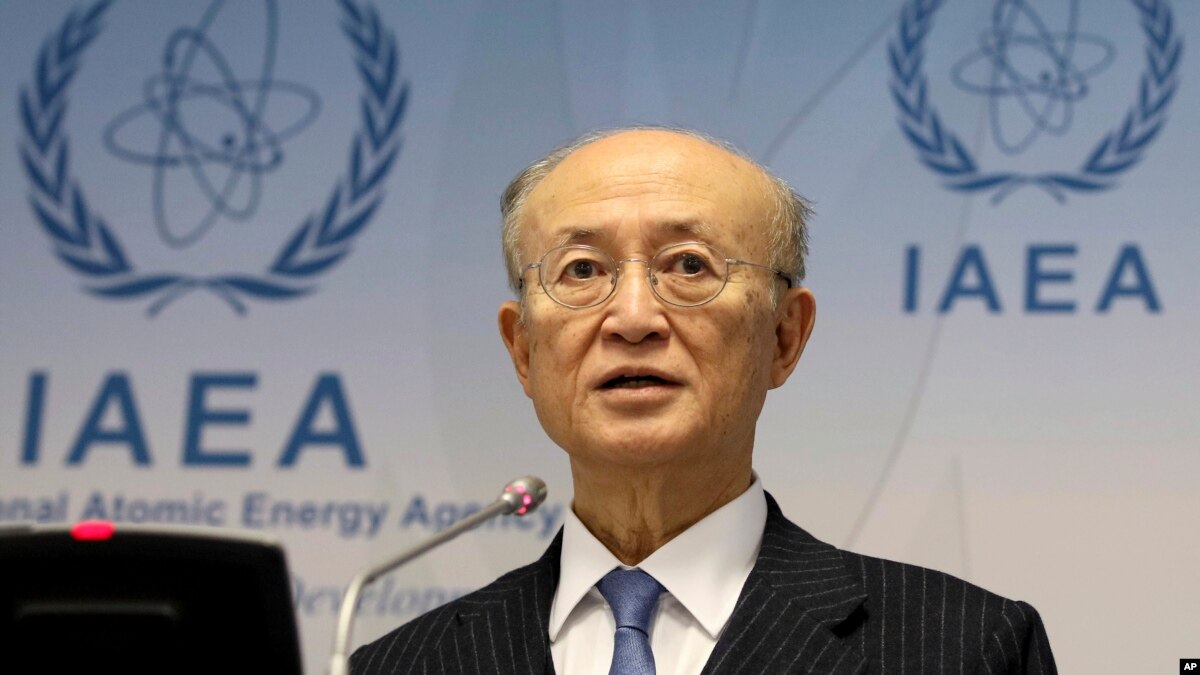
Iran is continuing to comply with the landmark 2015 deal with major powers aimed at preventing Tehran from building atomic weapons in exchange for economic incentives despite the United States withdrawing from the pact and re-imposing sanctions, the U.N. nuclear watchdog said Friday.
In a confidential quarterly report distributed to its member states and reviewed by The Associated Press, the International Atomic Energy Agency said Iran has been abiding with key limitations set in the so-called Joint Comprehensive Plan of Action, or JCPOA.
The U.S. pulled out of the deal in May and been pressuring remaining signatories to abandon it as well.
Every IAEA quarterly report issued since Washington withdrew reported Iran remained in compliance.
In its report, the Vienna-based agency said its inspectors still have access to all sites and locations in Iran they needed to visit.
"Timely and proactive cooperation by Iran in providing such access facilitates implementation of the Additional Protocol and enhances confidence," the report stated, referring to the procedure detailing safeguards and tools for verification.
It noted that Iran's stock of heavy water and low-enriched uranium continues to be under the limits set under the 2015 pact.
The other nations involved - Germany, Britain, France, Russia and China, as well as the European Union - have so far shown no inclination of abandoning the agreement. They instead have tried to provide Iran with enough economic incentives to make it work.
Thursday, February 21, 2019
Using Animals to Measure Sea Plastic
[unable to retrieve full-text content]
Researchers at Israel's Tel Aviv University who are monitoring the effects of plastics on animals have found an ocean dwelling helper. They're using a tiny nuisance of a creature called the sea squirt. VOA's Kevin Enochs reports. Read More Using Animals to Measure Sea Plastic : https://ift.tt/2IrTjX3Iran's Soleimani Warns Saudis After Deadly Attack in Southeast Region
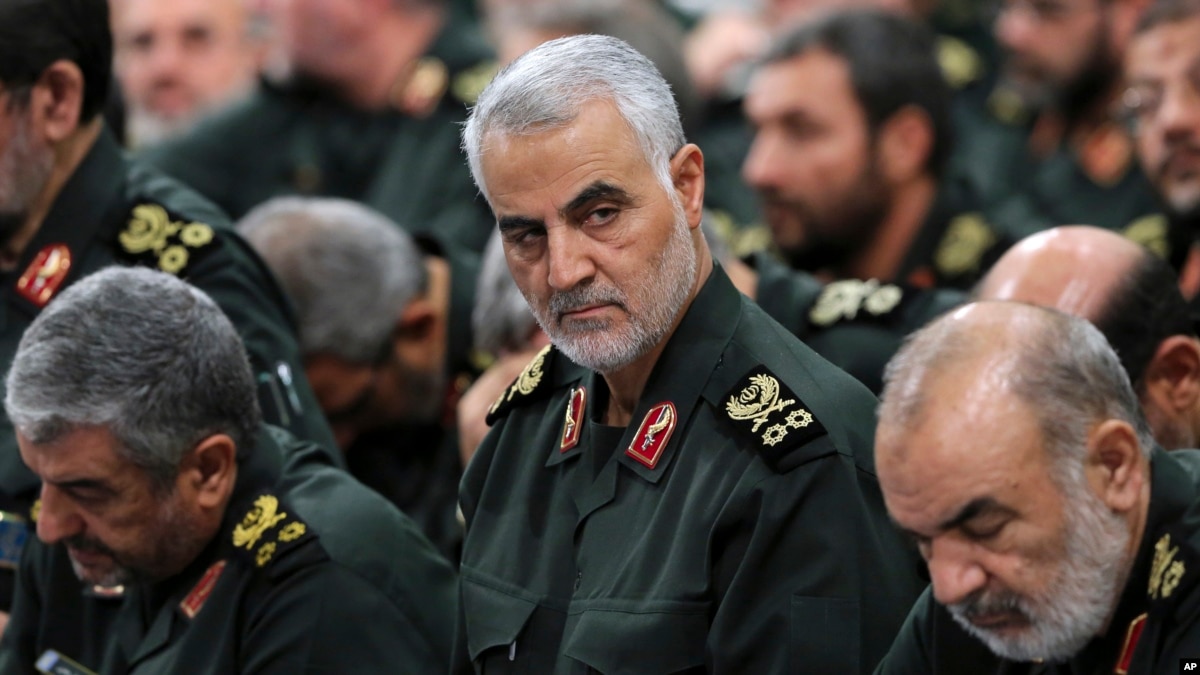
The commander of the overseas arm of Iran's Revolutionary Guards threatened Saudi Arabia with revenge over a suicide bomb attack in southeastern Iran on Feb. 13 that killed 27 Guards members, the semi-official Tasnim news agency reported on Thursday.
"Saudi Arabia is building its regional influence with money only. This is a false influence and a failure... We will take revenge for our martyrs... (and) it might be anywhere around the world," Qassem Soleimani said, according to Tasnim.
The Islamic Republic has accused arch regional rivals Saudi Arabia and the United Arab Emirates of backing militants who carry out attacks on security forces in Iran. Saudi Arabia and the UAE have denied any connection with the attacks.
The Sunni Muslim militant group Jaish al Adl (Army of Justice), which says it seeks greater rights and better living conditions for ethnic minority Baluchis in Iran, claimed responsibility for the attack near the border with Pakistan.
Iran`s Shi'ite Muslim authorities say militant groups operate from safe havens in Pakistan and have repeatedly called on the neighboring country to crack down on them.
"I am warning you: Don't test Iran's tolerance," Soleimani said in the latest in a series of warnings issued by Iranian officials since the attack was carried out.
UAE Signs $5.5 Billion in Military Contracts Amid Yemen Role Scrutiny
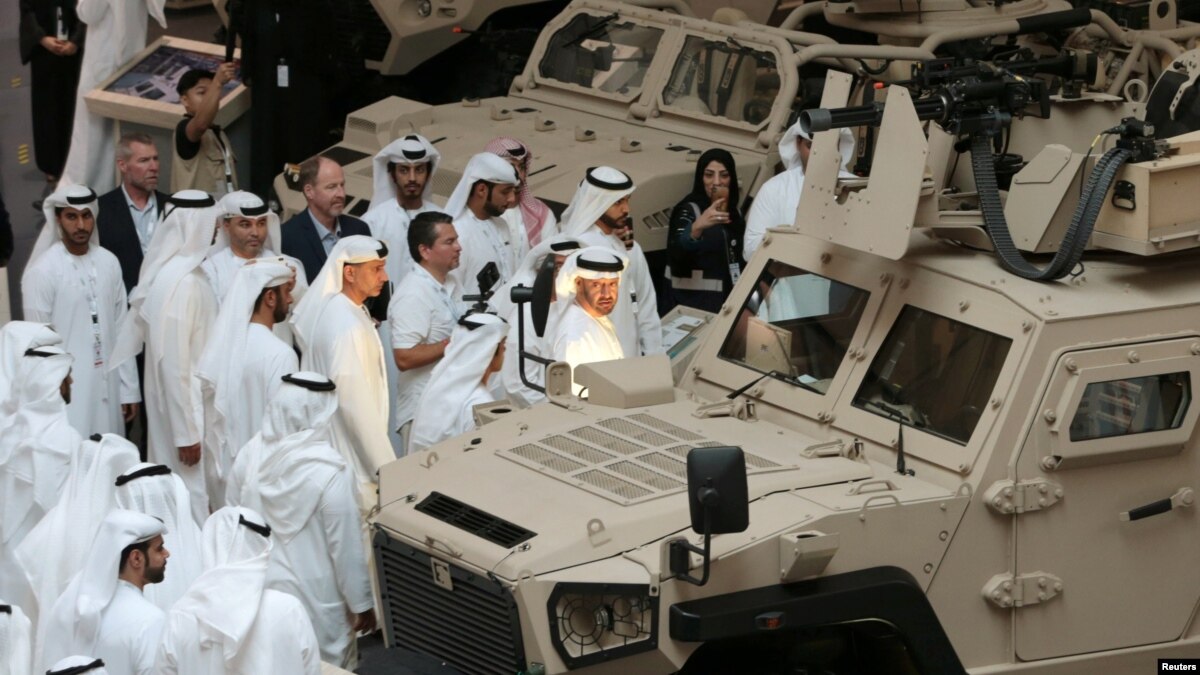
The United Arab Emirates awarded 20 billion dirhams worth ($5.5 billion) of military procurement contracts during a defense show this week, at a time when arms sales to the country are under scrutiny due to its role in Yemen's devastating war.
The majority were awarded to international companies such as U.S. firms Lockheed Martin and Raytheon, which sealed one of the biggest deals with 7 billion dirhams worth of contracts related to its Patriot missile air defense system.
Gulf Arab states including the UAE and Saudi Arabia have long been major buyers of U.S. weapons but have beefed up military purchases in recent years from other countries. This week, the UAE awarded deals to firms from Russia, Turkey, Pakistan and South Africa at the five-day IDEX military exhibition.
Defense industry executives said other countries stand to benefit from increased scrutiny of Western arms sales to a Saudi-led coalition involved in the Yemen war. The conflict killed tens of thousands of people and pushed the poorest Arabian Peninsula country to the edge of famine.
The UAE and Saudi Arabia are leading a Sunni Muslim coalition, which includes Yemeni forces, that is battling the Iran-aligned Houthi movement to try to restore the internationally recognized government ousted from power in 2014.
Some countries like Denmark and Germany last year suspended future approval of arms exports to Saudi Arabia following the murder last October of Saudi journalist Jamal Khashoggi at the kingdom's Istanbul consulate and over the Yemen conflict.
Late last year, U.S. lawmakers introduced various pieces of legislation seeking to put tighter controls on U.S. dealings with Riyadh, including clamping down on weapons sales and barring military cooperation with the coalition.
Saudi Arabia signed agreements this week at IDEX to develop its domestic defense industry as the kingdom, the world's top oil exporter, seeks to diversify its economy away from oil.
Saudi Arabian Military Industries (SAMI), the kingdom's state defense company, signed partnerships with France's Naval Group, Spain's Navantia, and Abu Dhabi state fund Mubadala. SAMI, established in May 2017, seeks to localize 50 percent of military spending by 2030 as part of Crown Prince Mohammed bin Salman's economic diversification plan.
China, Saudi Arabia Try to Walk Together Amid Hurdles
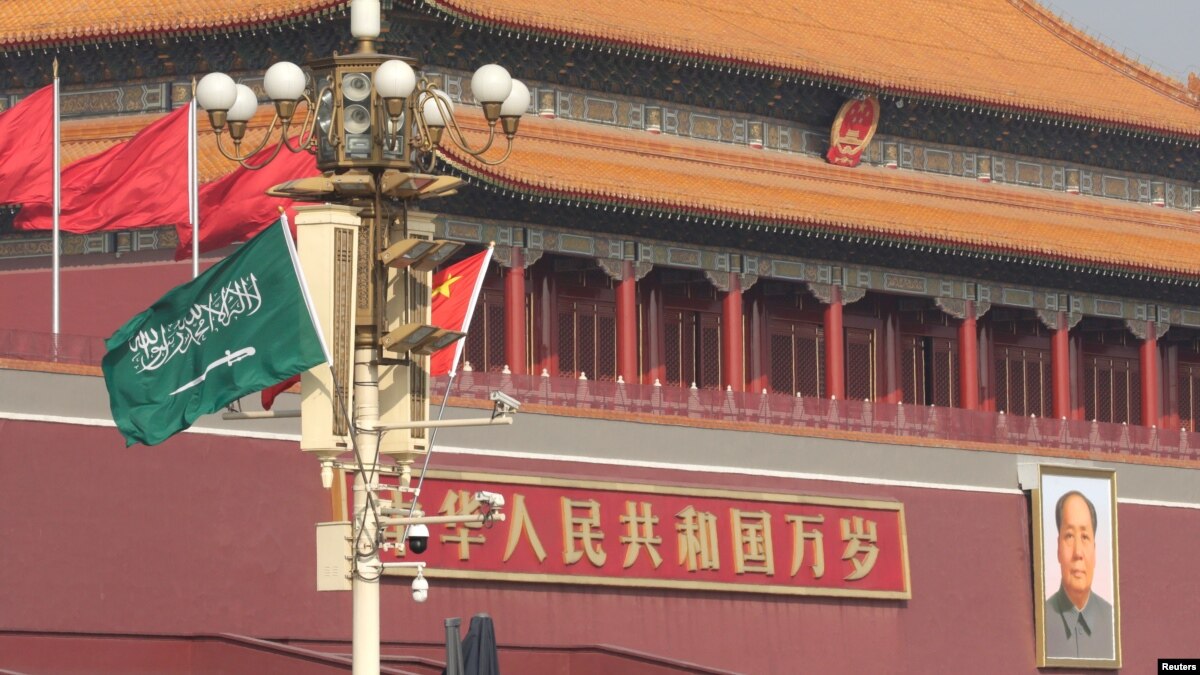
Saudi Arabia’s Crown Prince Mohammed bin Salman arrived in Beijing on Thursday for a two-day visit to boost the country’s international image sullied by the recent killing of Saudi journalist Jamal Khashoggi and to enhance economic ties. But the path to better ties between Saudi Arabia and China is riddled with political hurdles.
China has spent the last few days assuring Iran, Saudi Arabia’s political rival, that the Crown Prince’s visit would not affect its approach to the Middle East. Chinese President Xi Jinping told visiting Iranian Parliament Speaker Ali Larijani on Wednesday that his resolve to develop a comprehensive strategic partnership with Iran will remain unchanged.
Saudi Arabia, a Sunni country, and Iran where most people belong to the Shia Muslim sect, have been engaged in a long standing struggle for influence in the Middle East.
For Beijing, it’s a delicate balancing act between Saudi Arabia, which is seen as a close ally of the U.S., and Iran, which is openly critical of Washington.
“China has been good at keeping a kind of subtle balance between Iran and Saudi Arabia,” Jean-Pierre Cabestan, professor of politics at the Hong Kong Baptist University said.
Beijing needs support from both wealthy Muslim nations at a time when it is engaged in a trade war with the U.S. and a major slowdown in its economy. It also needs Saudi support for the Belt and Road program, which has not yet made much of a mark west of Pakistan.
Mutual concerns
Beijing’s own relationship with Riyadh has not been very smooth. “The relationship [of China] with Saudi Arabia has never been easy,” Cabestan said.
One issue is Iran. “The other issue [between China and Saudi Arabia] is more religious because it has to do with the restrictions imposed on the Chinese Muslims in China. Not only the Uighur but also the Hui people in Ningxia,” he said.
The Saudi leadership has to worry about its image in the Muslim world and close association with China involves some risks. But China has its own worries about engaging too closely with Saudi Arabia.
“China is very worried about any kind of Wahabi influence on its Muslims. And that has always been a kind of objective limitation to any kind of friendship or close cooperation and understanding between the two countries,” Cabestan said.
The Saudi Crown Prince introduced a new element to this delicate relationship by emerging as an investment rival in Pakistan, which is the showcase country for China’s prestigious Belt and Road program.
He announced a $20 billion investment in Pakistan, half of which will go to building an oil refinery in Gwadar next to a Chinese built port in the coastal city.
Though the investment would boost the China Pakistan Economic Corridor (CPEC), part of the Belt and Road program, it could also be a matter of concern for Beijing.
“In practice, a major additional investor in or close to Gwadar should represent a boost for CPEC but Beijing will be a little politically wary nonetheless,” said Andrew Small, author of “China-Pakistan axis: Asia’s new geopolitics.”
“For Pakistan, it does represent a gentle rebalancing away from dependency on China, which some on the Pakistani side think had grown excessive — even if China will remain a critically important partner,” he said.
But Imtiaz Gul, executive director of the Islamabad-based Center for Research & Security Studies, does not agree, The latest investment comes after consultations between China, Saudi Arabia and Pakistan to further develop CPEC, he said.
“Multilateral or bilateral relations are not defined by faith and ideologies. They are determined by economic interests, " Gul said.
Economic dimensions
The Saudi prince also offered to invest $100 billion in different projects across India. This is significant because India has been reluctant to adopt the Belt and Road program and accept Chinese investment offers related to it. The large scale Saudi entry into India’s investment market would reduce New Delhi’s need for Chinese money.
Though political aspects may pose problems, China and Saudi Arabia are expected to make some breakthroughs in economic areas.
There is an attempt to combine Saudi Vision 2030 with China’s Belt and Road program. Saudi Vision 2030 aims at diversifying the country from an oil-based economy to one that is a producer of exportable goods and services.
“Although Washington remains its most important strategic partner, Riyadh seems to be preparing for a post-oil era, by enhancing its cooperation with other countries, which it hopes can bring about more chances to deepen cooperation with emerging economies, so as to improve its ability to withstand economic and political risks by putting its eggs in different baskets,” said Niu Song, a researcher in Middle East studies at Shanghai International Studies University.
China hopes to win more oil projects like the Yanbu refinery in Saudi Arabia while Riyadh wants to attract Chinese investment in infrastructure construction, housing, and tourism development.
Read More China, Saudi Arabia Try to Walk Together Amid Hurdles : https://ift.tt/2NhhoyAWednesday, February 20, 2019
France Discussing With Iran Fate of Citizen Arrested in October
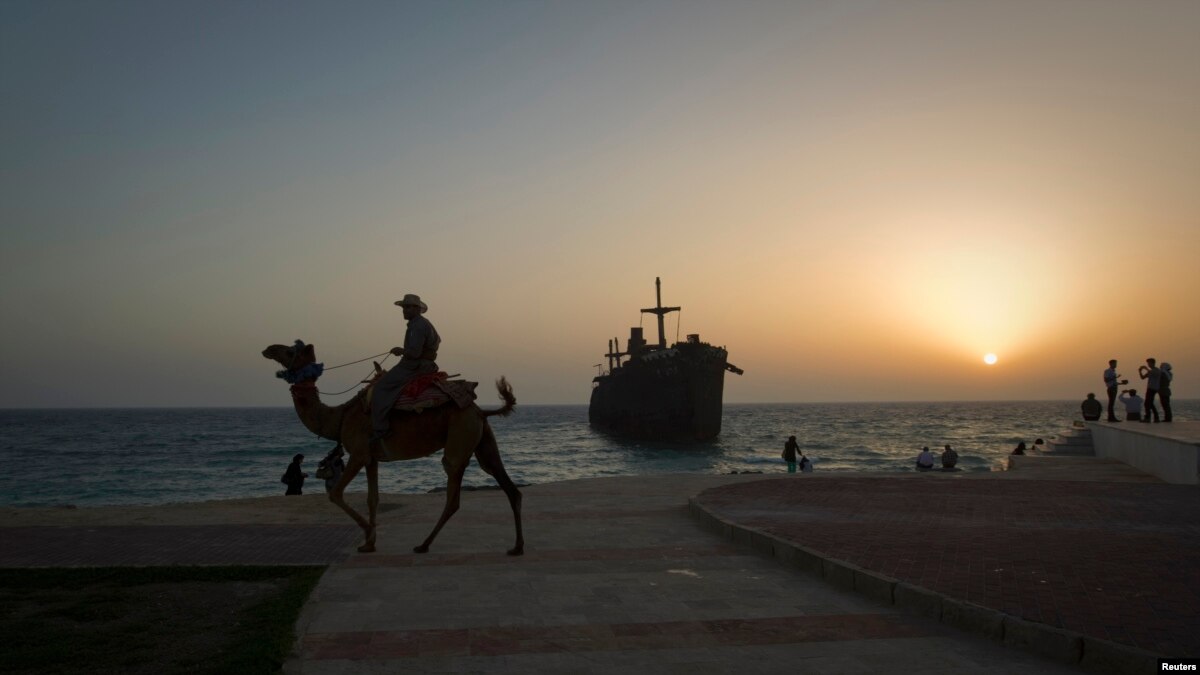
France is in touch with Iran to improve the conditions of a French woman who was arrested in October on the Gulf island of Kish for allegedly signing an illegal mining contract, Foreign Minister Jean-Yves Le Drian said on Wednesday.
Nelly Erin-Cambervelle, a 59-year-old businesswoman from Martinique, had been on the island as part of her import-export business and her arrest until now had not been made public.
"She went to Kish island, not far from Dubai, which is considered to be Iranian territory. She was arrested and she is today in prison since Oct. 21, 2018 on the grounds of having signed an illegal contract and carrying out a non-authorised trip," Le Drian told lawmakers.
Details over her arrest first appeared in the local Martinique media last week after Patricia Gros-Desirs Dicanot, a friend and colleague of Erin-Cambervelle, was quoted as saying that she had been arrested for illegally buying gold after originally going to Kish to begin negotiating a minerals contract.
Dicanot said that the Iranian authorities were demanding 40,000 euros ($45,392) for her release.
Le Drian declined to give any further details on the specifics of the case.
"The consular services have been able to meet her several times and are very concerned about her situation," Le Drian said. "We are in touch with the family and with the Iranian authorities to ensure that Mrs Erin's situation improves, while respecting Iranian procedures."
Iranian officials did not immediately respond for comment.
Relations between France and Iran have been strained over the last six months despite the two sides committing to upholding a 2015 nuclear deal.
Paris suspended nominating a new ambassador to Iran last year after an alleged plot by Iranian intelligence and had not responded to Tehran nominations for the top diplomatic post in France.
US Sanctions Indian National, Declaring Him a Drug Trafficker
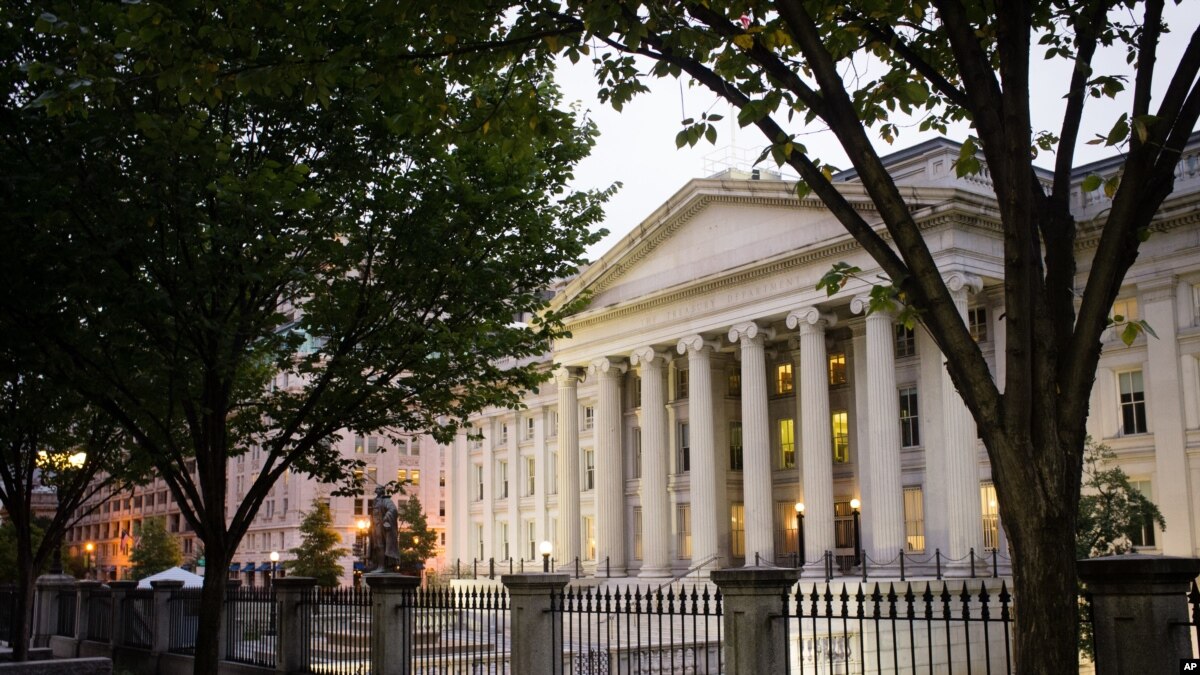
The Trump administration on Wednesday imposed sanctions on Indian national Jasmeet Hakimzada, declaring him a major foreign drug trafficker.
Six other people and entities were also sanctioned, including Hakimzada's parents, who allegedly help him run his operation.
"Jasmeet Hakimzada's global drug trafficking and money laundering network has been involved in smuggling heroin and synthetic opioids around the world," a senior Treasury Department official said.
Hakimzada lives in the United Arab Emirates. He is accused of running a worldwide drug trafficking ring that smuggles heroin, cocaine, opioids and other substances into the United States, Australia, Britain and New Zealand.
Treasury said he has laundered hundreds of millions of dollars through a trading company in the UAE.
A U.S. federal grand jury indicted Hakimzada in 2017 on 46 counts of drug trafficking and money laundering.
Under the sanctions, all of Hakimzada's assets in the U.S. are frozen and U.S. citizens are barred from doing any business with him.
Netanyahu Strikes Election Deal With Far-Right Parties
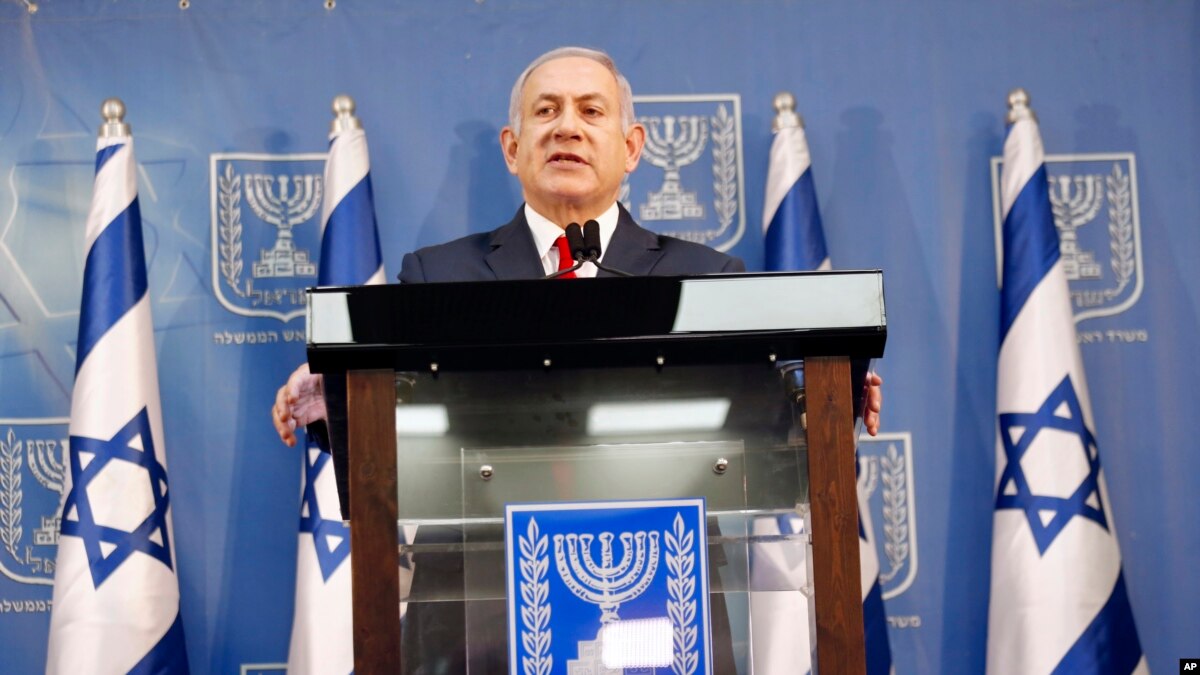
Israeli Prime Minister Benjamin Netanyahu on Wednesday reached a preliminary election deal with two fringe religious-nationalist parties in a bid to unify his hardline bloc ahead of April elections.
Netanyahu's Likud party announced it would reserve the 28th spot on its parliamentary list for the Jewish Home party and grant it two Cabinet ministries in a future government if it merges with the Jewish Power party.
Jewish Power is comprised of hardline religious nationalists who have cast themselves as successors to the banned Kahanist movement, which dreamed of turning Israel into a Jewish theocracy and advocated forced removal of its Palestinians.
Recent polls project Likud winning about 30 of Parliament's 120 seats, while Jewish Home and Jewish Power may not have enough support to enter Parliament on their own. Together, the two small parties would likely cross the electoral threshold and capture several parliamentary seats.
The Jewish Home party sealed the deal in a committee vote on Wednesday, a day before parties running the April 9 parliamentary election must finalize their lineups.
Among the prominent figures in the joint Jewish Home-Jewish Power list are Bezalel Smotrich, a self-avowed “proud homophobe,” Itamar Ben Gvir, an attorney who has made a career defending radical Israeli settlers implicated in West Bank violence, and Benzi Gopstein, leader of an extremist anti-assimilation group whose Twitter handle translates to “Kahane was right.”
The late American-born Rabbi Meir Kahane's Jewish Defense League is considered a terrorist organization by the FBI.
Ben Gvir, a member of Jewish Power, said that his faction “put personal honor aside” to prevent Netanyahu's main election rival from forming a government.
Netanyahu's gambit drew criticism from opposition politicians. Labor Party leader Avi Gabbay called the move “bankruptcy” of the Likud party's values.
Benny Gantz, a former army chief who is Netanyahu's main challenger, criticized the prime minister's courting of extremists. His Israeli Resilience party said: “Netanyahu lost touch with his Zionism and with his dignity.”
Netanyahu's move to unite right-wing nationalist parties ahead of Thursday's party list deadline was one of several last-minute negotiations across the spectrum to form broader blocs.
Gantz and Yair Lapid, a leading opposition politician and former finance minister, also spent much of Wednesday hashing out a possible centrist union.
Israeli Official: Netanyahu-Putin Meeting in Moscow Delayed
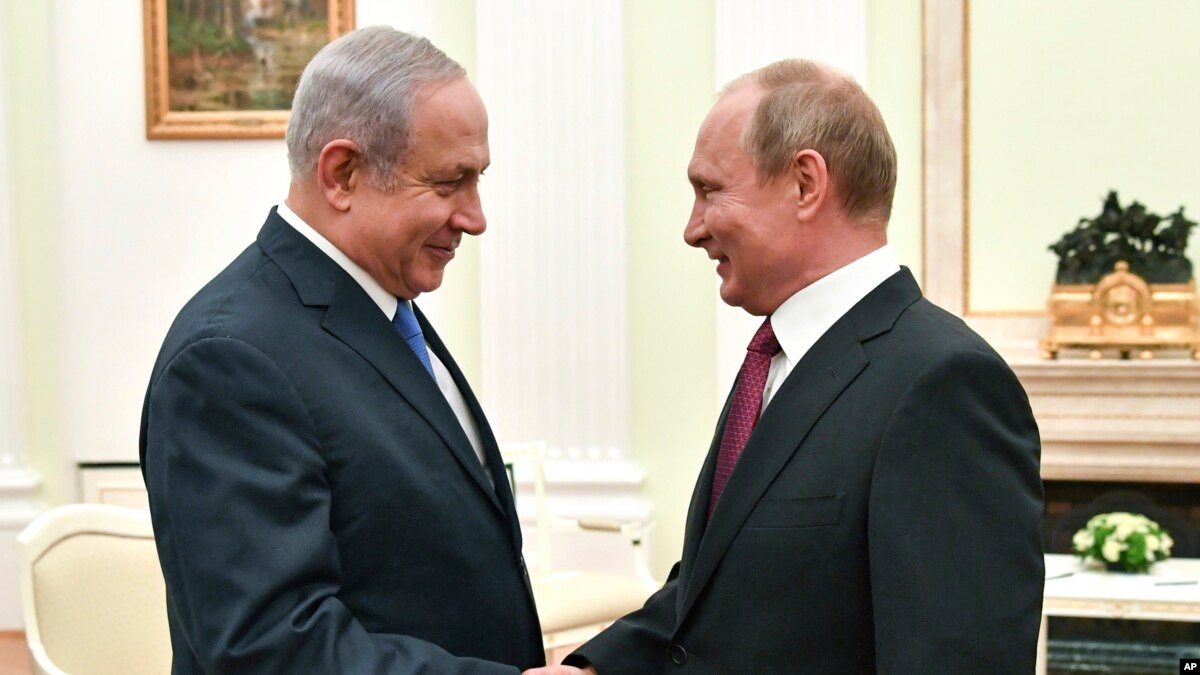
An Israeli government official says a planned meeting in Moscow between Prime Minister Benjamin Netanyahu and Russian President Vladimir Putin has been postponed.
The official, speaking on condition of anonymity Wednesday because of the sensitivity of the matter, says the meeting was delayed in mutual agreement. The two will have a telephone call Thursday and schedule a new meeting soon.
Netanyahu and Putin have been recently holding regular consultations to coordinate operations in war-torn Syria. The meeting was to be the first since a Russian place was shot down in Syria by anti-aircraft fire.
Israeli media report the delay is due to Netanyahu's domestic political concerns, saying he wants to oversee mergers in his nationalistic camp before a Thursday night deadline to submit party lists for the upcoming April election.
Egypt Executes 9 Over 2015 Killing of Top Prosecutor
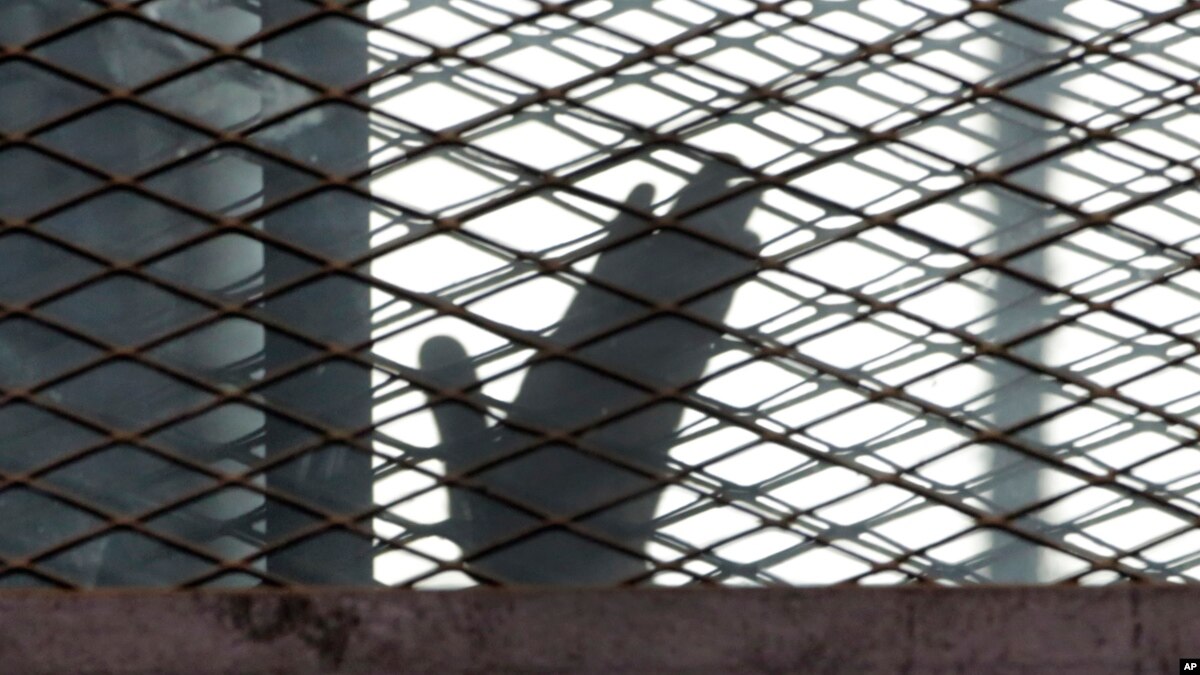
Egypt on Wednesday executed nine suspected Muslim Brotherhood members convicted of involvement in the 2015 assassination of the country’s top prosecutor, security officials said.
The nine were found guilty of taking part in the bombing that killed Hisham Barakat, the first assassination of a senior official in Egypt in a quarter century. Barakat was also the most senior official killed since the military overthrew an elected but divisive Islamist president in 2013.
The officials, who spoke on condition of anonymity because they were not authorized to brief media, said the families of the men were told to pick up their bodies from a Cairo morgue.
A total of 15 people have been executed in Egypt since the start of the year. Three were hanged earlier this month for their involvement in the 2014 killing of a judge’s son in the Nile Delta town of Mansoura. Authorities executed another three for killing a police officer in Cairo in Sep. 2013. Rights groups decried the executions, saying the men were sentenced to death following torture and beatings to extract confessions.
Amnesty International on Tuesday called on Egypt to halt the latest executions, saying that some defendants said they were forcibly disappeared and confessed under torture.
“There is no doubt that those involved in deadly attacks must be prosecuted and held accountable for their actions, but executing prisoners or convicting people based on confessions extracted through torture is not justice,” said Amnesty’s Najia Bounaim.
Egypt’s highest appeals court upheld the death sentences in November. It commuted six other death sentences to life in prison. Death sentences were also handed down in 2017 to 13 defendants tried in absentia. They will be eligible for a new trial if they surrender or are captured. Turkey deported one of the 13 last month.
The Muslim Brotherhood was Egypt’s best-organized opposition movement for decades and won a series of elections after an Arab Spring uprising in 2011 ended President Hosni Mubarak’s nearly three-decade rule.
But the Brotherhood's Mohammed Morsi, Egypt's first freely elected civilian prersident in 2012, proved divisive, and the military led by then-general Sissi removed him from power amid mass protests against his rule a year later.
Since then authorities have waged an extensive crackdown on Islamists and government opponents, arresting and detaining thousands and levelling harsh sentences against them. The Brotherhood has been banned and declared a terrorist group.
Islamic militants have meanwhile stepped up attacks since Morsi’s 2013 overthrow. An Islamic State affiliate based in the northern Sinai Peninsula has repeatedly targeted security forces and the Christian minority. Another group, known as Hasm, which has targeted security forces, has been linked to the Brotherhood.
The assassination of Barakat recalled one of Egypt’s darkest chapters under Mubarak's autocratic rule, when Islamic militants and the state security apparatus engaged in retaliatory killings for nearly a decade starting in 1990. That year, the militants gunned down parliament speaker Rifaat el-Mahgoub in Cairo, the last assassination of a senior official. There were attempts against other ministers until the insurgency was crushed in the late 1990s.
Tuesday, February 19, 2019
US-Backed Forces Warn Last Islamic State Fighters in Syria to Give Up or Die
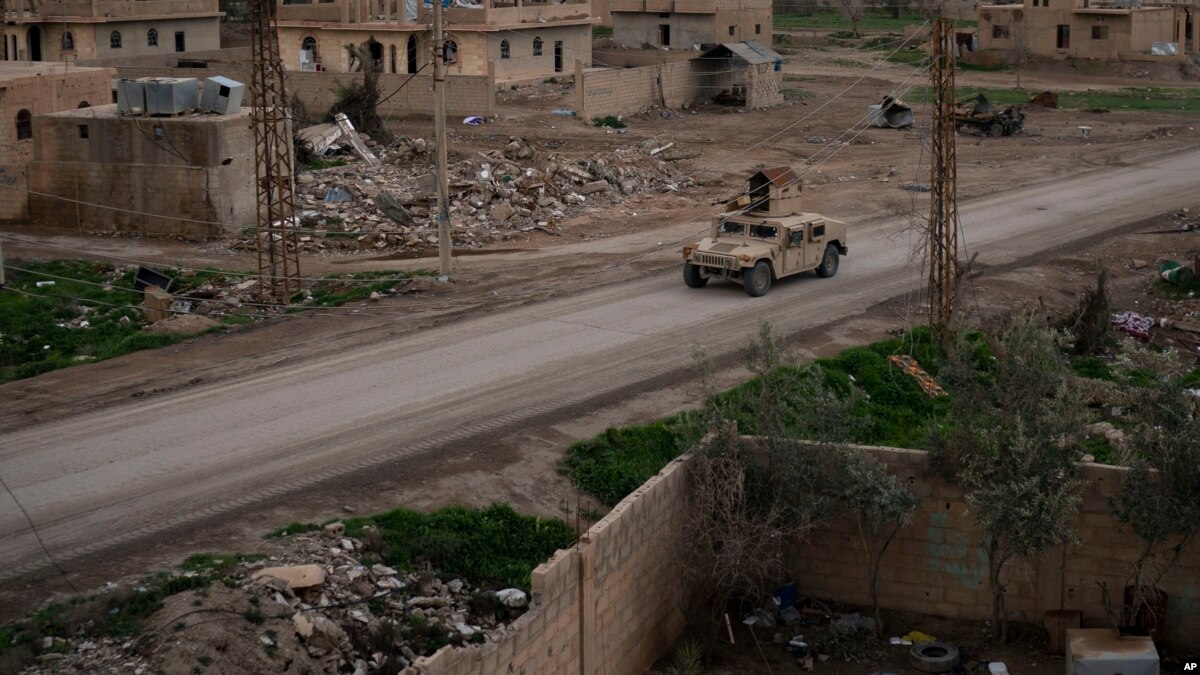
A U.S.-backed militia in Syria is warning the last remaining Islamic State fighters there to surrender or die.
Dozens of trucks appeared on the outskirts of the village of Baghouz on Tuesday to evacuate any Islamic State fighters who decide to give up, along with their families.
The Kurdish-led Syrian Democratic Forces said they will attack after evacuating civilians.
But U.N. human rights officials said they are concerned about the estimated 200 families holed up in Baghouz. They said IS fighters are actively preventing women and children from leaving.
Thousands of people, including civilians and some suspected foreign fighters who had joined IS, have streamed out of Baghouz in the past several weeks.
The Trump administration wants European countries to take back their fighters who fled home to join the militants.
Britain has refused and is stripping them of their citizenship. France has also shown little enthusiasm for repatriating ex-Islamic State fighters.
Kurdish forces who have been fighting IS with the support of U.S. forces said they expect total defeat of IS in Syria by the end of the week.
"In a few days, we will announce a great victory over the largest terrorist organization that waged war on the world," a senior Kurdish fighter said Tuesday.
Meet the Sea Squirt, Sucking up Plastic Particles From the Sea
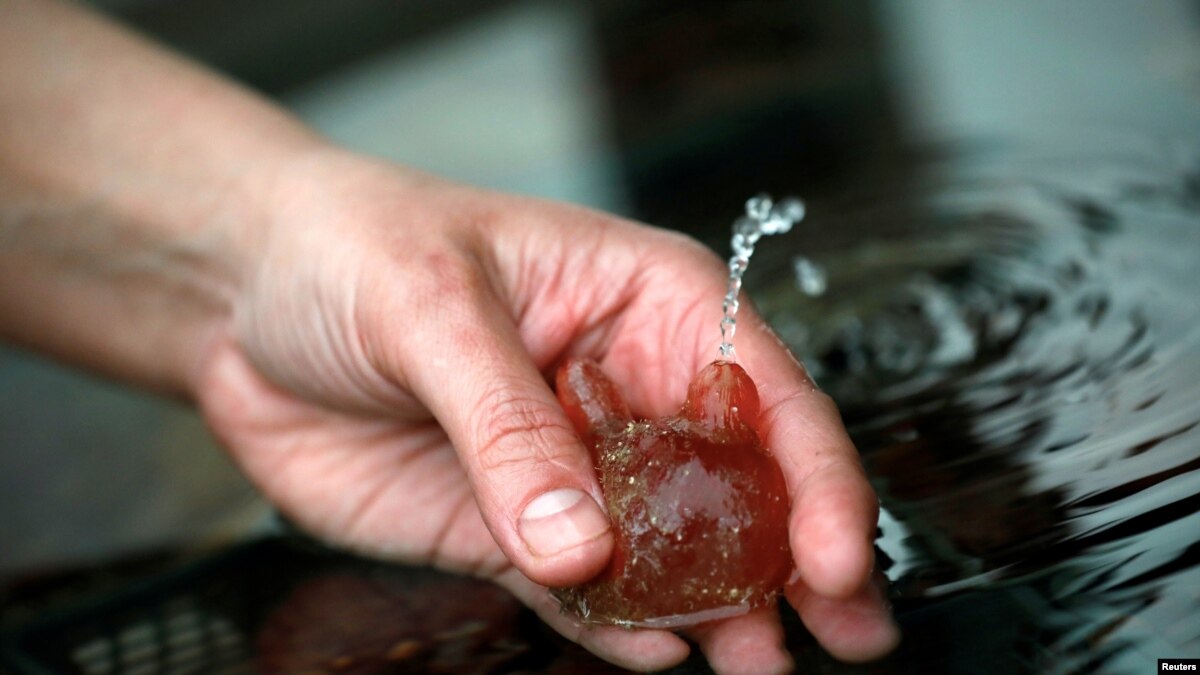
A rubbery sea creature with an irritating habit of clinging to ships and invading beaches could help measure plastic pollution as it can filter tiny particles from the ocean and store them in its soft tissue.
Israeli researchers have found that ascidians - round, palm-sized animals also known as sea squirts can thrive in dirty industrial areas and pristine waters alike, allowing them to detect and analyze waste and its impact in various regions.
A staggering amount of plastic flows into the ocean each year. The United Nations says it is as if a garbage truck full of plastic was dumped into the water every minute, a rate some estimates show could lead to oceans carrying more plastic than fish in 30 years.
But the long-term impact of the waste, particularly tiny pieces called microplastic, is still not fully understood.
“[Sea squirts] just sit in one place all their life and filter the water, like a pump,” said Gal Vered of Tel Aviv University, and who co-published the researchers’ findings in the journal Marine Pollution Bulletin.
“They can really give us a picture of what the whole reef, the whole ecosystem felt during its life.”
As a bonus, sea squirts are related in evolutionary terms to human beings. So studying them and the plastic inside them could be more insightful than looking at creatures like fish or clams.
“Although we don’t look alike at all, we have similar systems,” said Noa Shenkar, of Tel Aviv University’s zoology department and museum of natural history.
Durable and dangerous
Plastic never disappears. Over time it breaks down into microplastics, ranging from the size of a grain of rice on down. They mix with tiny plastic beads found in products like cosmetics and cleaners that were flushed away.
These are eaten by wildlife, filling their bellies, exposing them to chemical additives and, potentially, entering the food chain, said Vered.
Vered searched piers and rocks in the Red Sea resort of Eilat, eventually finding a cluster of sea squirts on a brick.
Back in her lab, a gentle push on one squirt’s belly saw the creature let loose the eponymous squirt of water. Invisible to the naked eye are the microplastics, perhaps once part of a bag or bottle, and that were found at all the sites they tested along Israel’s coasts.
“We as humans invented a material that can last for hundreds, thousands of years, and then we use it as a single-use product. It’s quite a paradox,” she said.
Lebanon Nominates Challenger to Trump's Choice to Lead World Bank
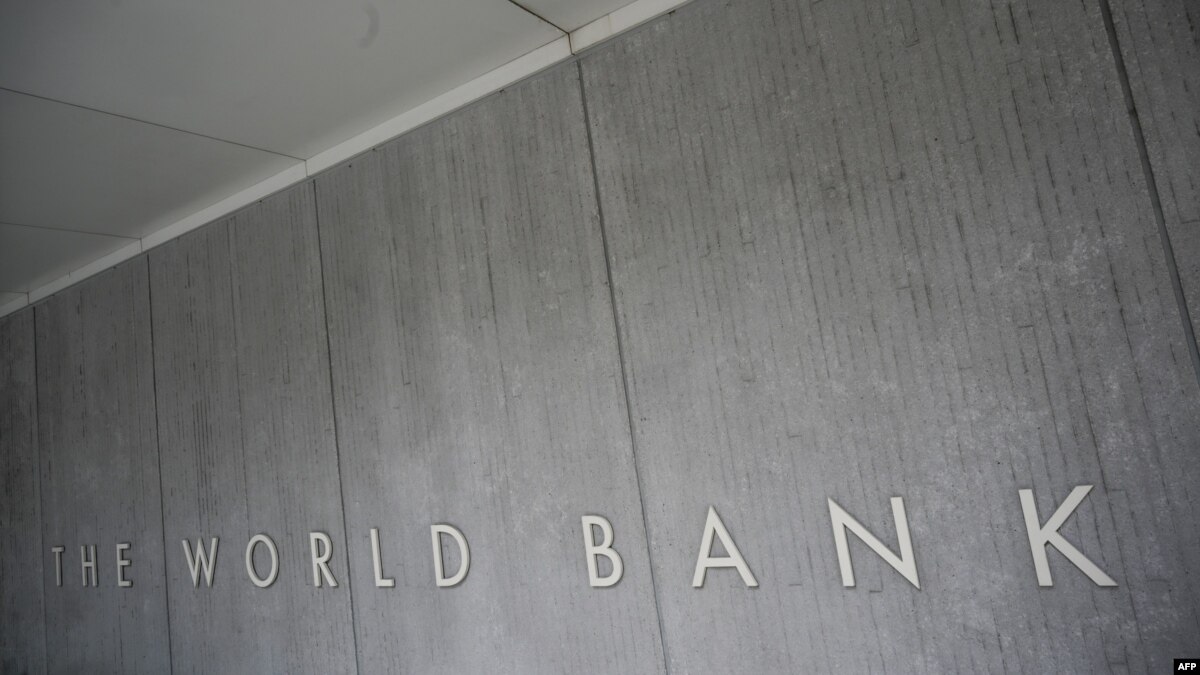
Lebanon has nominated investment banker Ziad Hayek as a candidate for president of the World Bank, mounting the first challenge to U.S. President Donald Trump's choice to lead the development lender, Hayek said in a Twitter post on Tuesday.
Hayek, who has served as secretary general of Lebanon's High Council for Privatization since 2006, also posted a nomination letter from Lebanon's finance ministry.
He is challenging Trump's nomination of David Malpass, U.S. Treasury undersecretary for international affairs. Malpass has met a tepid response from some World Bank board members due to his status as a Trump loyalist who has criticized the bank and multilateral institutions in the past.
Hayek's entry into the race could draw other candidates into a contest expected to be decided before World Bank and International Monetary Fund meetings in April. The World Bank is accepting nominations through March 14 and will narrow the field to up to three candidates for a board vote.
The United States, which controls the most voting power on the World Bank board, has chosen every past leader of the bank, but the tradition has been challenged by emerging markets in recent years.
Hayek has previously served as chief executive of Lonbridge Associates in London, and was a board member of BIT Bank in Beirut. He also worked as a senior managing director of Bear Stearns, where Malpass had served as chief economist prior to its 2008 collapse.
Suicide Bombing Kills 3 Policemen Near Cairo's Famed Bazaar
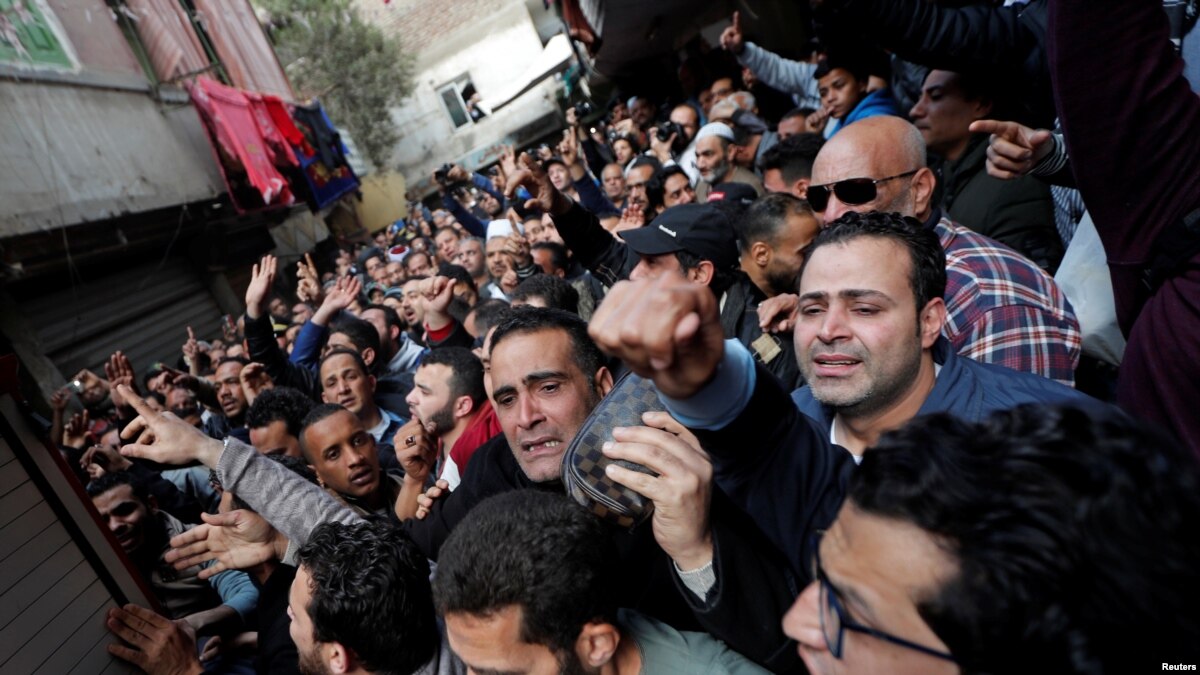
The death toll from a late-night suicide blast near Cairo's famed tourist market rose to three on Tuesday after a police officer died of his wounds, Egypt's Interior Ministry said.
The fatalities in the attack near the Khan el-Khalili bazaar in the heart of Cairo were all policemen. The explosion late Monday also wounded two other policemen and a woman, officials said.
The attack was a rarity for the central area of Egypt's capital amid a years-long security crackdown under President Abdel-Fattah el-Sissi.
The Interior Ministry said the attacker, 37-year-old al-Hassan Abdullah, blew himself up after police officers approached to arrest him. He was wanted in a bombing last Friday near a mosque in Cairo's district of Giza and the police had been monitoring his movements, the statement said.
No claim of responsibility
The attacker's affiliation was not known and no militant group claimed responsibility for the bombings.
The ministry had blamed members of the outlawed Muslim Brotherhood for last week's attack, which it said targeted a security checkpoint and wounded three people.
Following Monday's explosion, which shattered windows and blew curtains off nearby balconies, police and soldiers cordoned off the narrow streets around the bazaar. A body, presumably of the attacker, covered with a white sheet stained with blood, was seen lying on the ground in the blocked-off area, close to Egypt's renowned Al-Azhar mosque.
In a house nearby, police found a bomb and bomb-making material, which prompted the evacuation of the whole building, said the security officials.
Militants killed in Sinai Peninsula raids
In the restive north of Egypt's Sinai Peninsula, security forces killed 16 militants and seized explosives and weapons in two raids, security officials said Tuesday. The raids involved clashes with Islamic militants in the desert outside the city of el-Arish, they said. It was unclear when the battle took place
Officials spoke on condition of anonymity because they were not authorized to talk to the media.
Egypt has been battling Islamic militants for years, but the insurgency gained strength after the 2013 overthrow of an elected but divisive Islamist president, Mohammed Morsi. The militants have mainly targeted security forces and Christians.
Egypt last year launched a wide-scale security operation focused on northern Sinai, where an Islamic State affiliate has carried out many attacks in recent years.
Egypt Denies New York Times Journalist Entry: Report
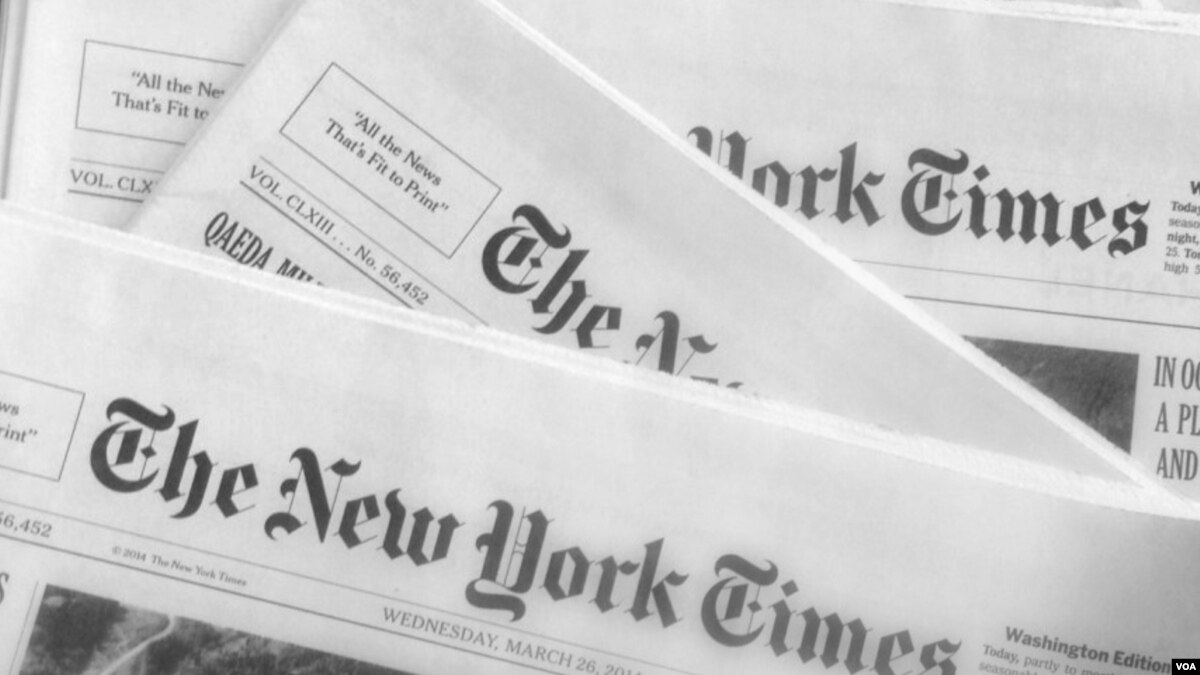
Egyptian authorities have denied entry to a veteran New York Times journalist, the US-based newspaper reported on Tuesday.
David Kirkpatrick arrived at Cairo airport on Monday but was barred from entering the country, the newspaper said.
Security officials held him "incommunicado for hours before forcing him onto a flight back to London without explanation," the New York Times reported.
Egypt's interior ministry could not immediately be reached for comment.
Kirkpatrick was the newspaper's Cairo bureau chief from 2011 to 2015 and last year authored a book on the Arab Spring uprisings.
His writings have long stirred controversy and pro-government media in Egypt have previously criticised his reporting.
In 2018, pro-government newspaper "Youm7" accused Kirkpatrick of "deliberately distorting Egypt's (image)" after he reported on Egyptian officials' "tacit acceptance" of the United States' recognition of Jerusalem as the capital of Israel.
Kirkpatrick's denial of entry is part of a broader crackdown on media in Egypt over recent years.
Last month an Egyptian court sentenced a television host to one year in prison for interviewing a gay man.
A British journalist was expelled in February 2018, with officials claiming she broke the law by conducting interviews without a press permit.
A new law ratified in September tightened internet controls, granting authorities powers to monitor popular social media accounts and block those found publishing "fake news".
Rights groups say such legislation aims to strengthen state control of the media and curb freedom of expression.
Egypt ranked 161 out of 180 countries on the World Press Freedom Index in 2018 and 2017.
Efforts Resume to Evacuate Civilians From IS Area in Syria
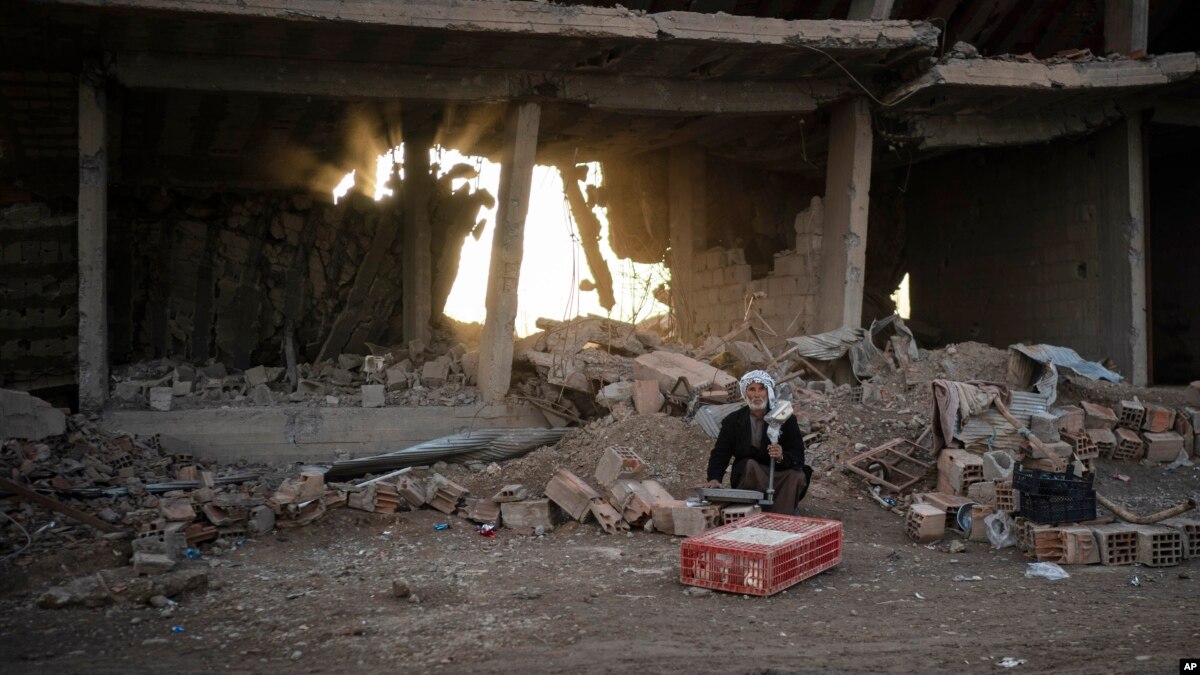
Dozens of trucks arrived Tuesday at the outskirts of a besieged enclave held by the Islamic State group in eastern Syria, signaling renewed efforts to evacuate hundreds of civilians trapped in the militants' last patch of territory along the Euphrates River.
A spokesman for the U.S.-backed Syrian militia that is spearheading the fight against IS said a military operation aimed at ousting the extremists from the enclave will begin if they don't surrender.
Such an operation would take place after separating or evacuating civilians from the militants, estimated to be about 300 combatants, said Mustafa Bali, the spokesman for the Syrian Democratic Forces.
The Islamic State group has been reduced from its self-proclaimed caliphate that once spread across much of Syria and Iraq at its height in 2014 to a speck of land on the countries' shared border. In that tiny pocket on the banks of the river, the militants are hiding among civilians in the shadow of a small hill, encircled by forces waiting to declare the territorial defeat of the extremist group.
“We are working on either separating the civilians or evacuating them and raiding the place,” Bali told The Associated Press.
His comments came as there appeared to be an easing in the standoff and as an evacuation of civilians appeared to be resuming a week after it had stopped when the militants closed all the roads.
AP journalists saw dozens of trucks moving to the tip of a humanitarian corridor used in past weeks. That corridor had been deserted for the last week after thousands fled through it.
About 40 civilians, including a French woman, left the enclave Tuesday morning, apparently after paying smugglers, said a member of the Free Burma Rangers, a volunteer medical group.
By sundown, there was no sign of any civilians coming out. On the other side of the IS-held pocket, an airstrike was launched by the U.S.-led coalition.
An SDF commander, Zana Amedi, said his group made a final warning to remaining militants to surrender. In a Twitter post, he said most of them are seriously wounded or sick.
The Syrian Observatory for Human Rights, a Britain-based war monitor, said about 50 trucks belonging to the coalition arrived at the outskirts of the area.
Adnan Afrin, a commander with the SDF, said a number of civilians and some fighters have turned themselves in, and that the trucks went to the corridor to get them. He reported some clashes on the other side of the enclave between IS militants who don't want to surrender and SDF fighters.
A U.N. official said she is concerned about the condition of the some 200 families trapped in the enclave.
In a statement issued in Geneva, U.N. human rights chief Michelle Bachelet said the extremists are actively preventing civilians, including women and children, from leaving the area.
The International Rescue Committee said Monday that more than 60 people have died in recent weeks after making their way out of the IS-controlled area, most of them from exhaustion and malnutrition. They either died along the way or soon after arriving at a massive camp in northern Syria that is hosting those fleeing in eastern Deir el-Zour province.
In southern Syria, near the border with Jordan, the Syrian government opened two humanitarian corridors Tuesday with the help of Russian troops for people who want to move from one camp to other parts of the country, the Russian Defense Ministry said.
The Rukban camp is home to about 40,000 displaced people who suffer from lack of food and medical supplies. It was not immediately clear if people had started leaving.
Last week, the U.N. and the Syrian Arab Red Crescent delivered badly needed humanitarian assistance as Russia offered to help relocate those willing to move to government-held areas in Syria.
Jordan closed the border because of security concerns. The Syrian government and its ally, Russia, have blamed U.S. troops stationed nearby for failing to provide security for aid shipments — allegations denied by the Americans.
In other fighting, government forces shelled a bakery, killing at least four people, including children, in the town of Khan Sheikhoun in Idlib province, the Observatory said. The Syrian Civil Defense, a government opposition group, said the shells killed five people, including two children, and also wounded five others. It said the bakery was knocked out of service.
Read More Efforts Resume to Evacuate Civilians From IS Area in Syria : http://bit.ly/2XladdoSearch
Featured Post
Tornado Watch for parts of Middle Georgia - wgxa.tv
[unable to retrieve full-text content] Tornado Watch for parts of Middle Georgia wgxa.tv "middle" - Google News December 30...
Postingan Populer
-
[unable to retrieve full-text content] Monroe County Middle School goes virtual next week due to COVID-19 exposure wgxa.tv "middl...
-
Members of the Meany Middle School PTSA are calling on Mayor Jenny Durkan , Seattle Parks , and City of Seattle officials to give a group...
-
The global demand for palm oil is driving the fires in Indonesia Quartz Palm oil is in your infant formula, chips, and shampoo. Develope...